Special Tools
EN 46114 Engine Lifting Brackets
Removal Procedure
- Turn the ignition key to the LOCK position.
- Disconnect the battery ground cable. Refer to Battery Negative Cable Disconnection and Connection.
- Remove the engine covers. Refer to Engine Cover Replacement.
- Remove the radiator air intake baffle. Refer to Cooling Fan and Shroud Replacement.
- Recover the air conditioning (A/C) refrigerant. Refer to Refrigerant Recovery and Recharging.
- Remove the air intake duct. Refer to Air Cleaner Inlet Duct Replacement.
- Depressurise the fuel system. Refer to Fuel Pressure Relief.
- Drain the cooling system. Refer to Cooling System Draining and Filling.
- Remove the radiator outlet hose. Refer to Radiator Outlet Hose Replacement.
- Compress the coolant bleed hose retaining clamp (4) at the outlet housing (1) end and slide 50 mm (2 in) along the coolant bleed hose (3).
- Remove the coolant bleed hose (3) from the outlet housing (1).
- Disconnect the coolant recovery hose (2) from the outlet housing (1).
- Plug or cap the cooling system hoses and inlets
- Disconnect the heater hose (1) from the heater pipe (2) in two places.
- Compress the vacuum hose retaining clamp (2) at the intake manifold vacuum port (3) and slide 50 mm (2 in) back along the vacuum hose (1).
- Disconnect the vacuum hose (1) from the intake manifold vacuum port (3) and secure away from the engine.
- Remove the engine coolant heater cord if fitted. Refer to Coolant Heater Cord Replacement.
- Rotate the engine control module (ECM) electrical connector levers (1) up to the unlocked position.
- Disconnect ECM electrical connectors (2) from the ECM.
- Disconnect the 56 pin engine wiring harness to main wiring harness electrical connector (1).
- Disconnect the two pin engine wiring harness to main wiring harness electrical connector (2).
- Remove the under hood body electrical centre (BEC) cover (1).
- Remove the positive cable protective cover (3).
- Remove the positive cable to under hood BEC plate retaining bolt (5).
- Disconnect the positive cable (2) from the upper under hood BEC plate (4).
- Remove the under hood BEC upper plate to lower plate retaining bolts (2).
- Raise the upper under hood BEC plate (1) from the lower under hood BEC plate (3).
- Detach the protector (1) from the base of the under hood BEC connector (2).
- Separate the body harness connector (1) from the engine connector (3).
- Reposition and secure the engine wiring harness and connector (3) on the engine.
- Remove the vehicle body ground cable to cylinder head retaining bolt (3)
- Disconnect the vehicle body ground cable (1) from the cylinder head (2).
- Remove the remote positive battery post cover (1) from the remote positive battery post.
- Remove the remote positive battery post to wiring harness retaining bolt (1).
- Remove the wiring harness (2) from the remote positive battery post.
- Disconnect the A/C pressure transducer electrical connector (1).
- Disconnect the A/C compressor electrical connector (1).
- Remove the suction/discharge line pad to A/C compressor retaining nut (1).
- Disconnect the A/C suction/discharge line pad (1) from the A/C compressor (3).
- Plug or cap the A/C suction/discharge pipe (1) ends and the compressor (3) ports.
- Remove and discard the A/C suction/discharge pipe sealing O-rings (2).
- Remove the A/C suction pipe pad to A/C suction pipe retaining nut (1).
- Disconnect the upper A/C suction pipe (1) from the lower A/C suction tube (3).
- Plug or cap the A/C suction pipe ends.
- Remove and discard the A/C suction pipe sealing O-ring (2).
- Reposition and retain the A/C suction/discharge pipes away from the engine.
- Disconnect the fuel feed hose (1) from the fuel feed pipe (2). Refer to Metal Collar Quick Connect Fitting Service or Plastic Collar Quick Connect Fitting Service.
- Plug or cap the fuel feed pipe (2) and fuel feed hose (1) ends.
- Disconnect the evaporative emission (EVAP) purge line (4) from the purge solenoid (3). Refer to Metal Collar Quick Connect Fitting Service or Plastic Collar Quick Connect Fitting Service.
- Plug or cap the (EVAP) purge line (4) and the purge solenoid (3) ends.
- Place a suitable container beneath the radiator and engine.
- Disconnect the transmission cooler line (2) from the flexible hose (1) at the quick connect fitting using tool. AU525.
- Reposition and secure the flexible hoses (1) away from the engine and subframe.
- Secure radiator and condenser assembly (2) to the front end assembly (3) with large zip ties or equivalent.
- Raise and support the vehicle. Refer to Lifting and Jacking the Vehicle.
- Remove the front air deflector. Refer to Front Air Deflector Replacement.
- Remove the Engine Splash Shield. Refer to Engine Splash Shield Replacement.
- Disconnect the radiator inlet hose. Refer to Radiator Inlet Hose Replacement.
- Place a suitable container under the power steering cooler.
- Release the power steering gear outlet hose spring clamp (2) and disconnect the power steering gear outlet hose (1) from the power steering cooler (3).
- Release the power steering reservoir inlet hose spring clamp (1) and disconnect the power steering reservoir inlet hose (2) from the power steering cooler (3).
- Disconnect the oil level/temperature sensor electrical connector (1).
- Remove the exhaust system. Refer to Exhaust System Replacement or Exhaust System Replacement.
- Remove the centre exhaust heat shield. Refer to Exhaust Heat Shield Replacement - Center.
- Remove the propeller shaft. Refer to Propeller Shaft Replacement.
- Remove the shift selector linkage rod to shift selector shaft retaining nut (3).
- Remove the shift selector linkage rod (1) from the shift selector shaft (2).
- Remove the starter motor. Refer to Starter Motor Replacement.
- Partially lower the vehicle.
- Remove the front wheels. Refer to Tire and Wheel Removal and Installation.
- Detach the front brake hose (1) from the strut mounted brake hose retaining bracket (2). Repeat for opposite side.
- Remove the front brake caliper anchor plate to knuckle retaining bolts (1). Repeat for opposite side.
- Remove the front brake caliper (2) from the front steering knuckle (3). Repeat for opposite side.
- Support the front brake caliper (1) with heavy mechanic's wire, or equivalent (2). Repeat for opposite side.
- Install two wheel nuts (4) to retain the front brake disc (3) to the hub (5). Repeat for opposite side.
- Disconnect the front wheel speed sensor jumper harness electrical connector (1) and secure away from the subframe and suspension components. Repeat for opposite side.
- Mark the intermediate steering shaft (1) in relation to the pinion shaft (3).
- Remove the intermediate steering shaft to pinion shaft retaining bolt (2).
- Disconnect the intermediate shaft (2) from the pinion shaft (3).
- Lower the vehicle.
- Retain the front strut assembly (1) to the front subframe (3) using heavy mechanics wire or equivalent (2). Repeat for opposite side.
- Remove the stud dust cover (1) from the strut assembly to front wheelhouse retaining nut (2).
- Remove the strut assembly to front wheelhouse retaining nut (2) while holding the strut piston shaft (4) with a suitable tool.
- Remove the strut assembly to front wheelhouse retaining plate (3).
- Position a suitable powertrain and/or engine lift table below the frame, engine and transmission.
- Raise the lift table and/or lower the vehicle to support the frame, engine and transmission.
- Remove the transmission support to body retaining bolts (1).
- Remove the subframe reinforcement plate to subframe retaining bolts (2).
- Remove the subframe reinforcement plate (3) from the subframe (1).
- Remove the subframe to body rear retaining bolts (1).
- Remove the subframe to body front retaining bolt (1). Repeat for opposite side.
- Remove the subframe to body retaining bolt (1). Repeat for opposite side.
- With the aid of an assistant, lower the table and/or raise the vehicle to remove the engine, transmission, front suspension and subframe assembly from the vehicle.
- Remove the engine and transmission wiring harness and related components. Refer to Engine Wiring Harness Assembly Removal.
- Remove the transmission cooler line clamp to alternator mounting bracket retaining nut (1).
- Remove the transmission cooler line clamp (3) and transmission cooler lines (2) from the alternator mounting bracket (4).
- Position the EN 46114 (2) on the engine (1).
- Install the J 41798 to the cylinder head retaining bolts (3) and tighten to 50 N·m (36 lb ft).
- Connect a suitable lifting crane to the engine lift brackets and raise the suitable lifting crane to support the engine.
- Position a second powertrain lift table below the transmission.
- Remove the transmission. Refer to Transmission Replacement.
- Remove the engine flywheel. Refer to Engine Flywheel Removal.
- Remove the catalytic converters. Refer to Catalytic Converter Replacement - Left Side and Catalytic Converter Replacement - Right Side.
- Remove the drive belt. Refer to Drive Belt Replacement.
- Separate power steering fluid reservoir (1) from the power steering fluid reservoir bracket (2).
- Remove the power steering pump to power steering pump bracket retaining bolts (3).
- Remove the power steering pump (1) from the power steering pump bracket (2) position the power steering pump aside.
- Remove the A/C compressor. Refer to Air Conditioning Compressor Replacement.
- Remove the A/C compressor mounting bracket. Refer to Compressor Mounting Bracket Replacement.
- Remove the alternator. Refer to Generator Replacement.
- Attach a suitable lifting chain and hooks to the EN 46114 .
- Using a suitable lifting crane, raise the engine to clear the engine mount stud.
- Remove the engine mount brackets with the engine mounts. Refer to Engine Mount Bracket Replacement - Left Side and Engine Mount Bracket Replacement - Right Side.
- Remove the engine from the subframe
- Remove the alternator bracket. Refer to Generator Bracket Replacement.
Warning: Refer to Battery Disconnect Warning in the Preface section.
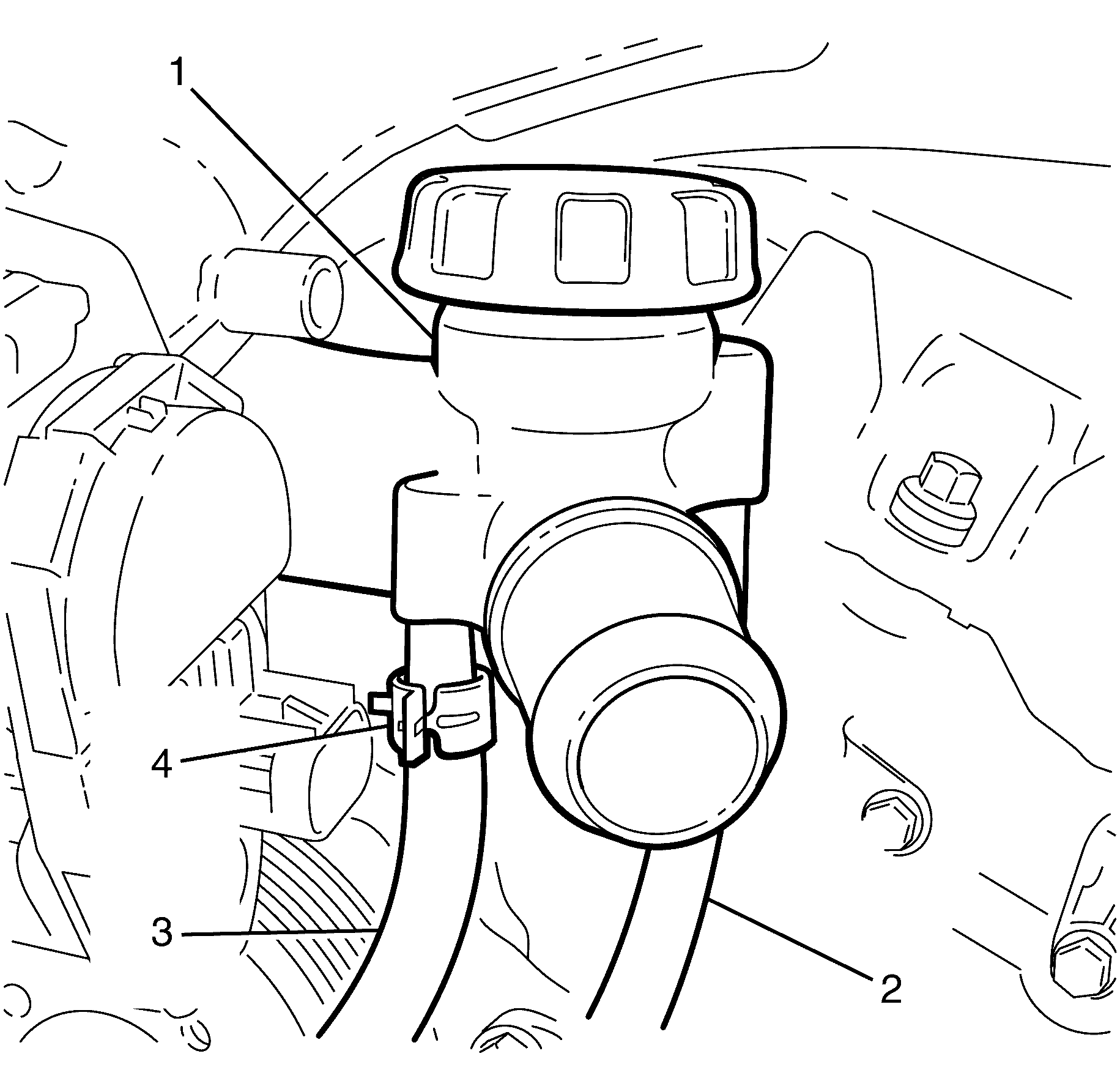
Note: Twist and pull the coolant recovery hose (2) to remove from the outlet housing (1).
Note: Plug or cap the hoses and inlets when separating the cooling system components, this prevents dirt and other contaminants from entering the cooling system.
Warning: Refer to Safety Glasses Warning in the Preface section.
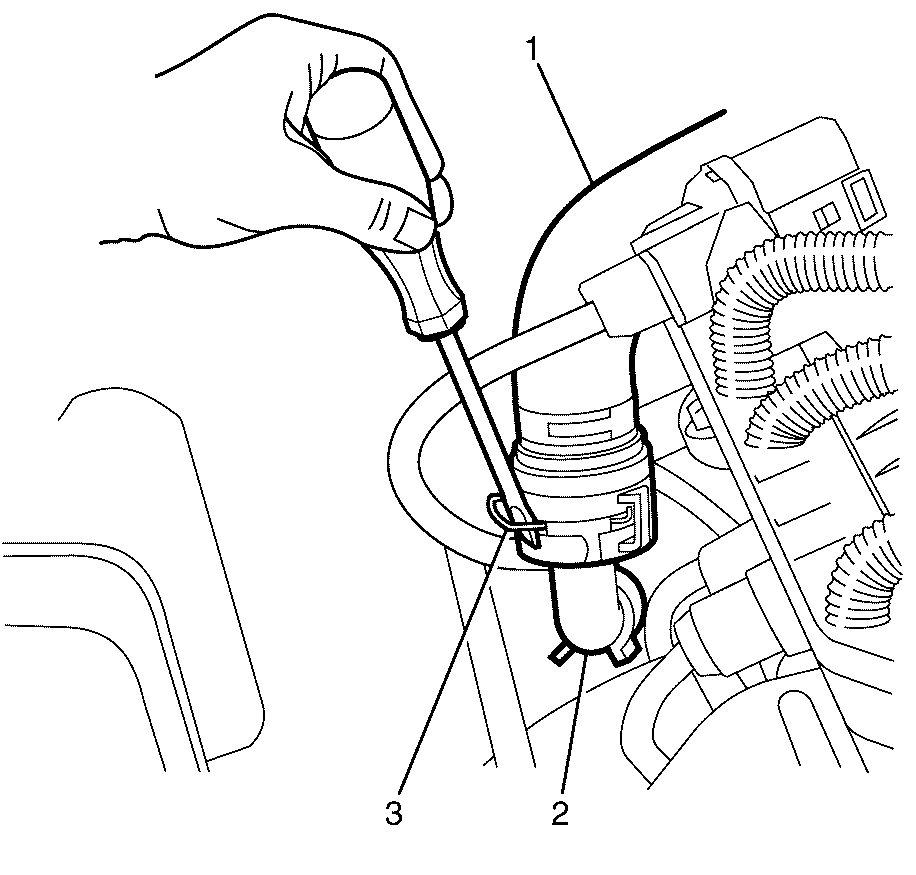
Note: The inlet and outlet heater hoses (1) are retained to the heater pipes (2) by quick connect fittings. Disconnect the heater hose (1) quick connect fittings by releasing the retaining clips (3) with a suitable tool.
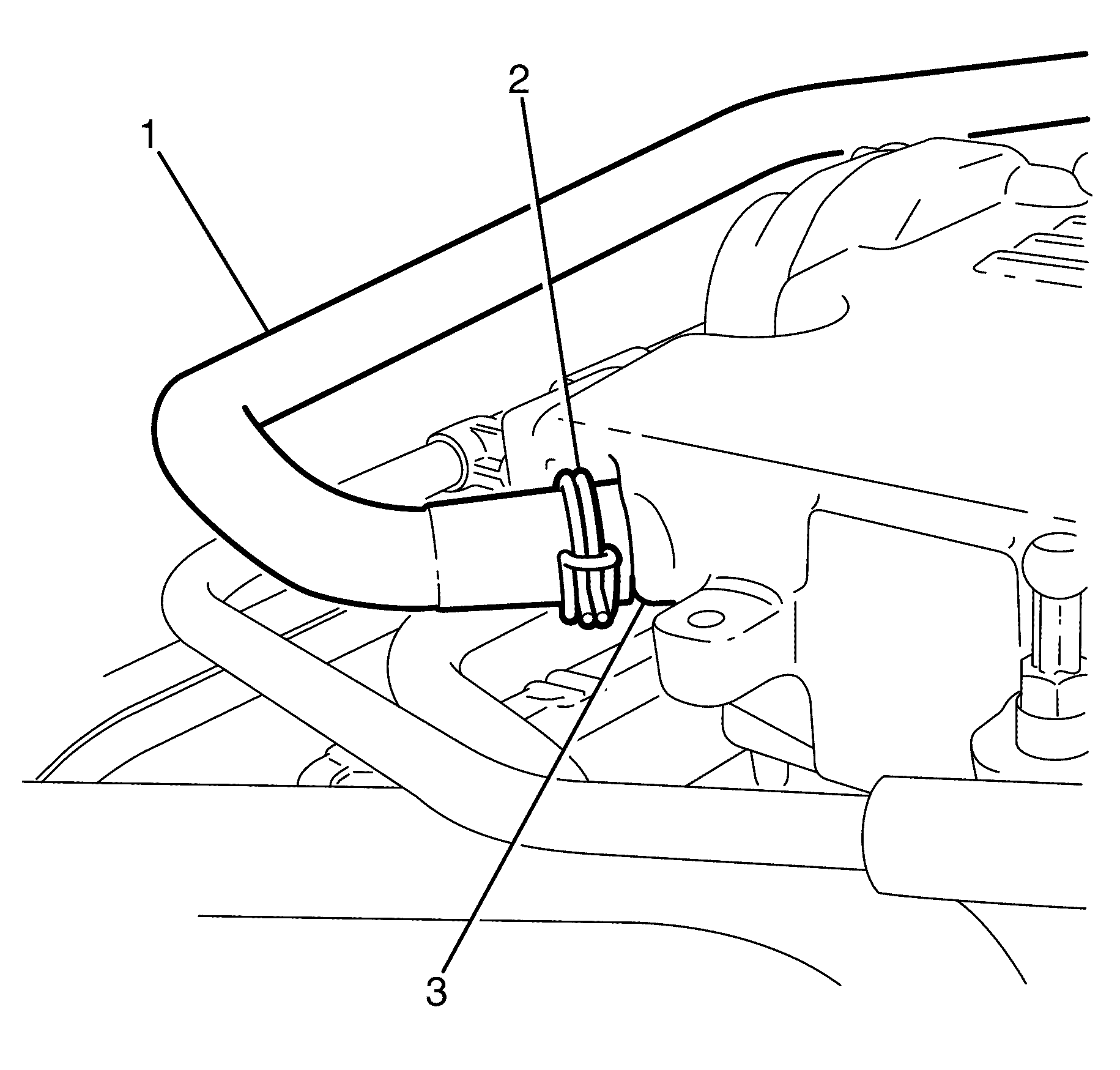

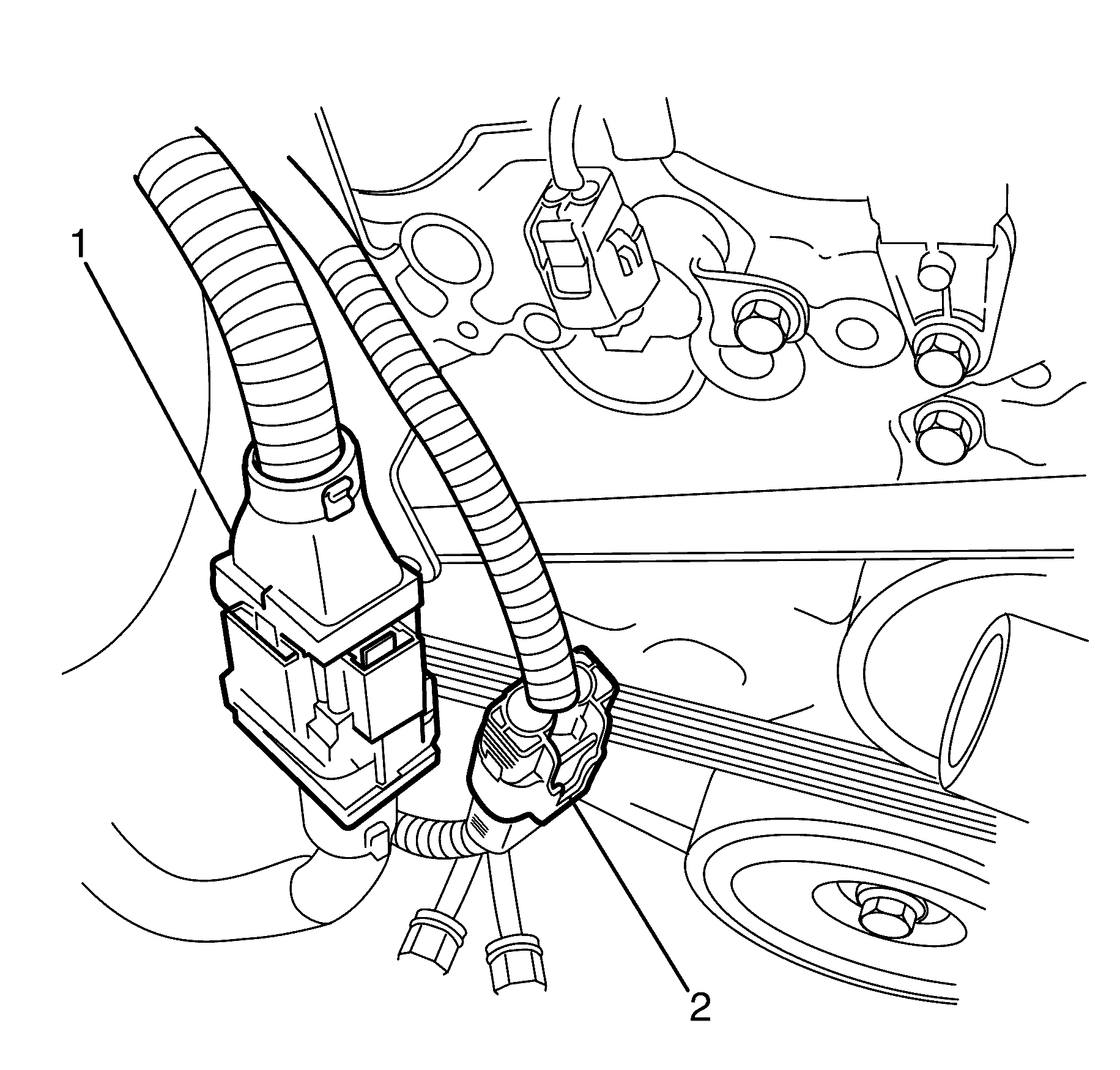
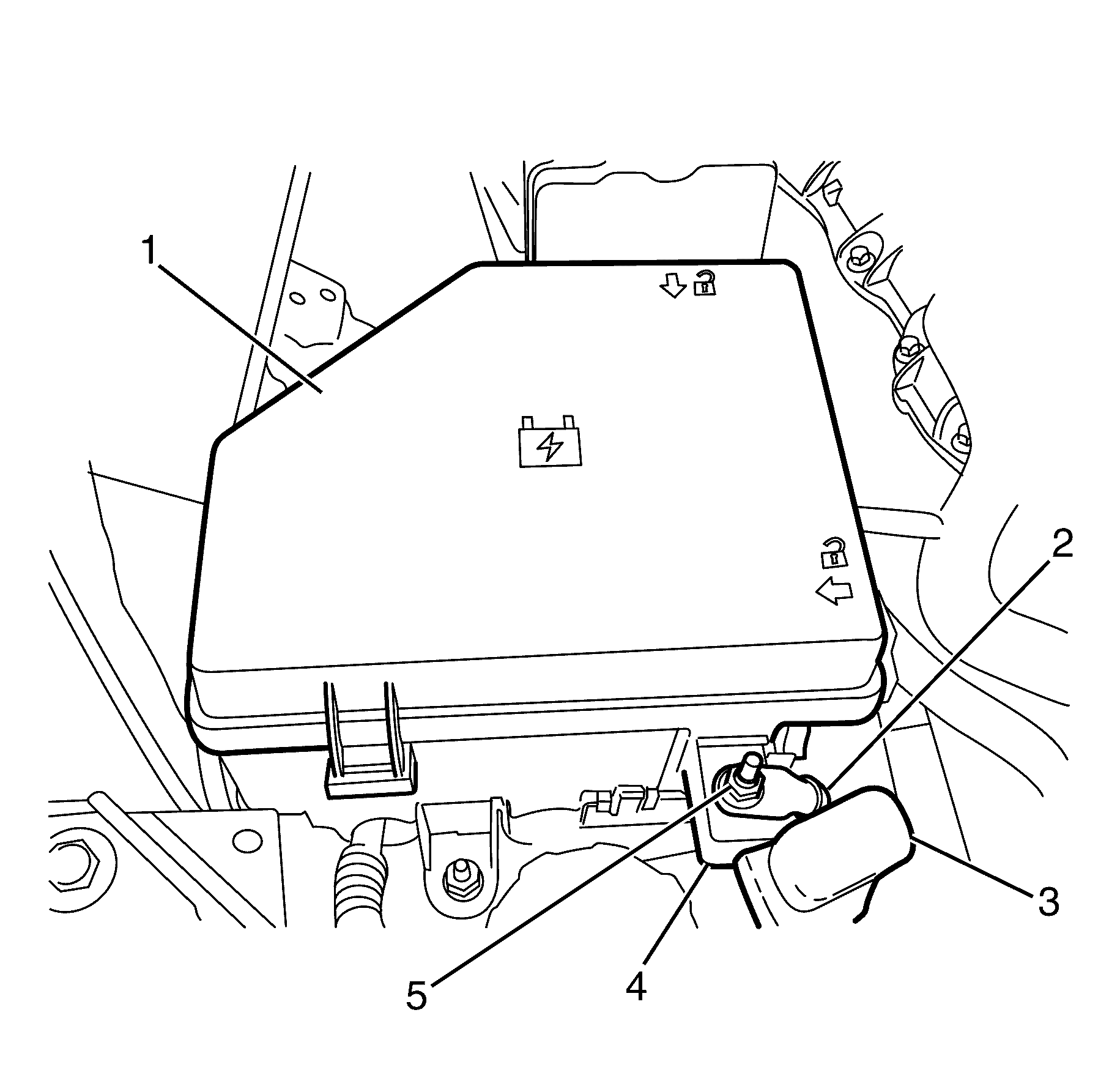
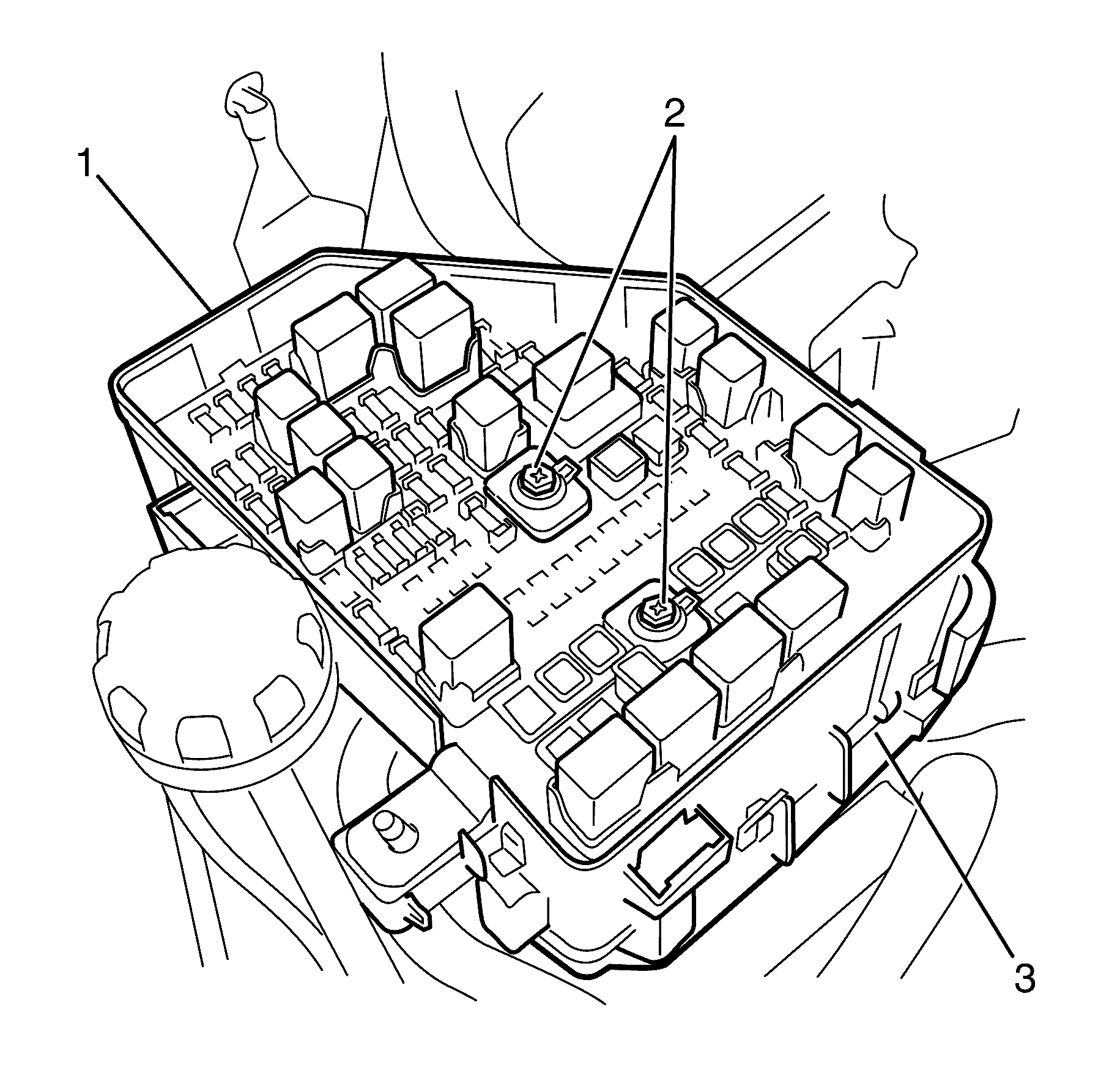
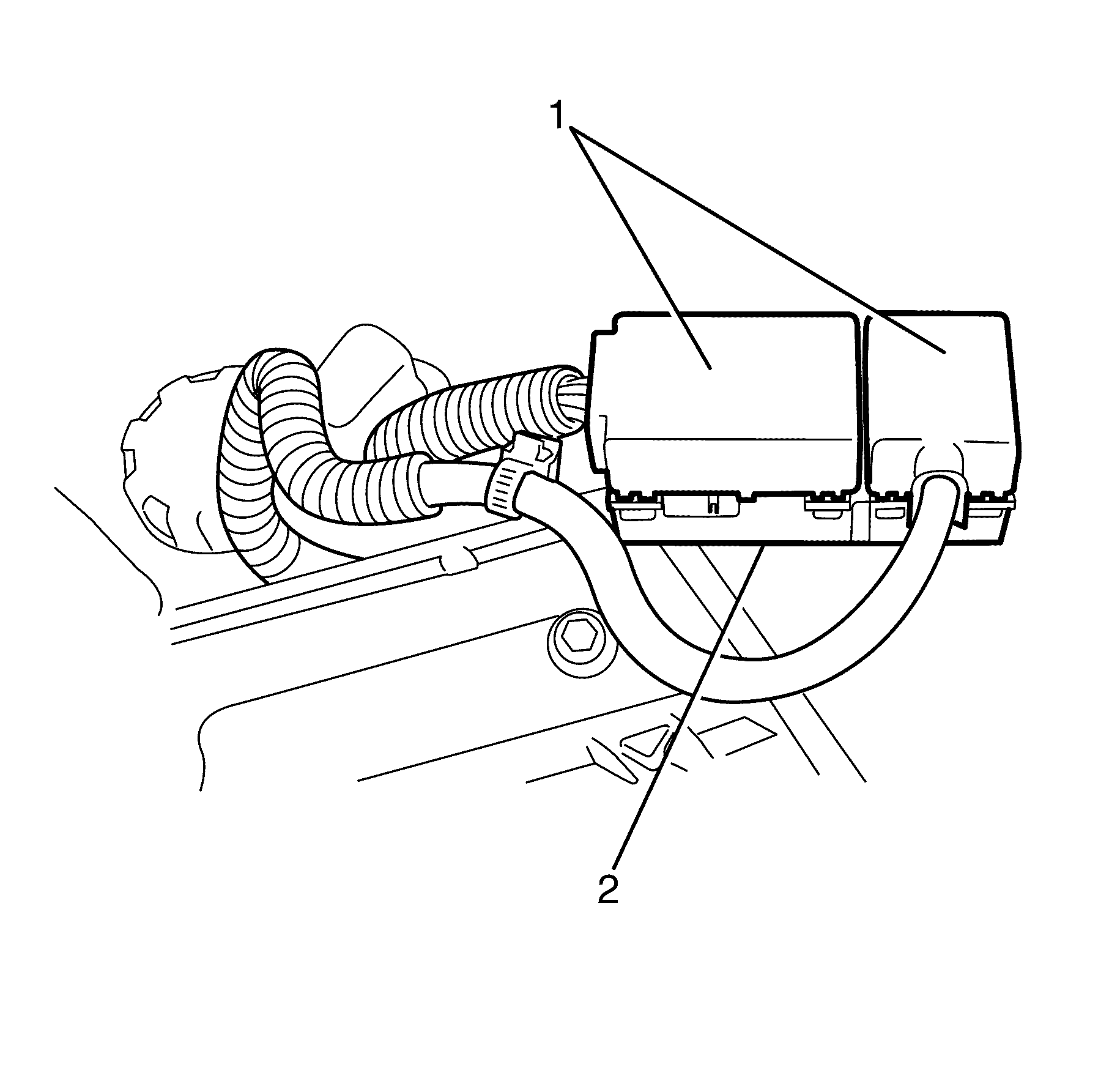
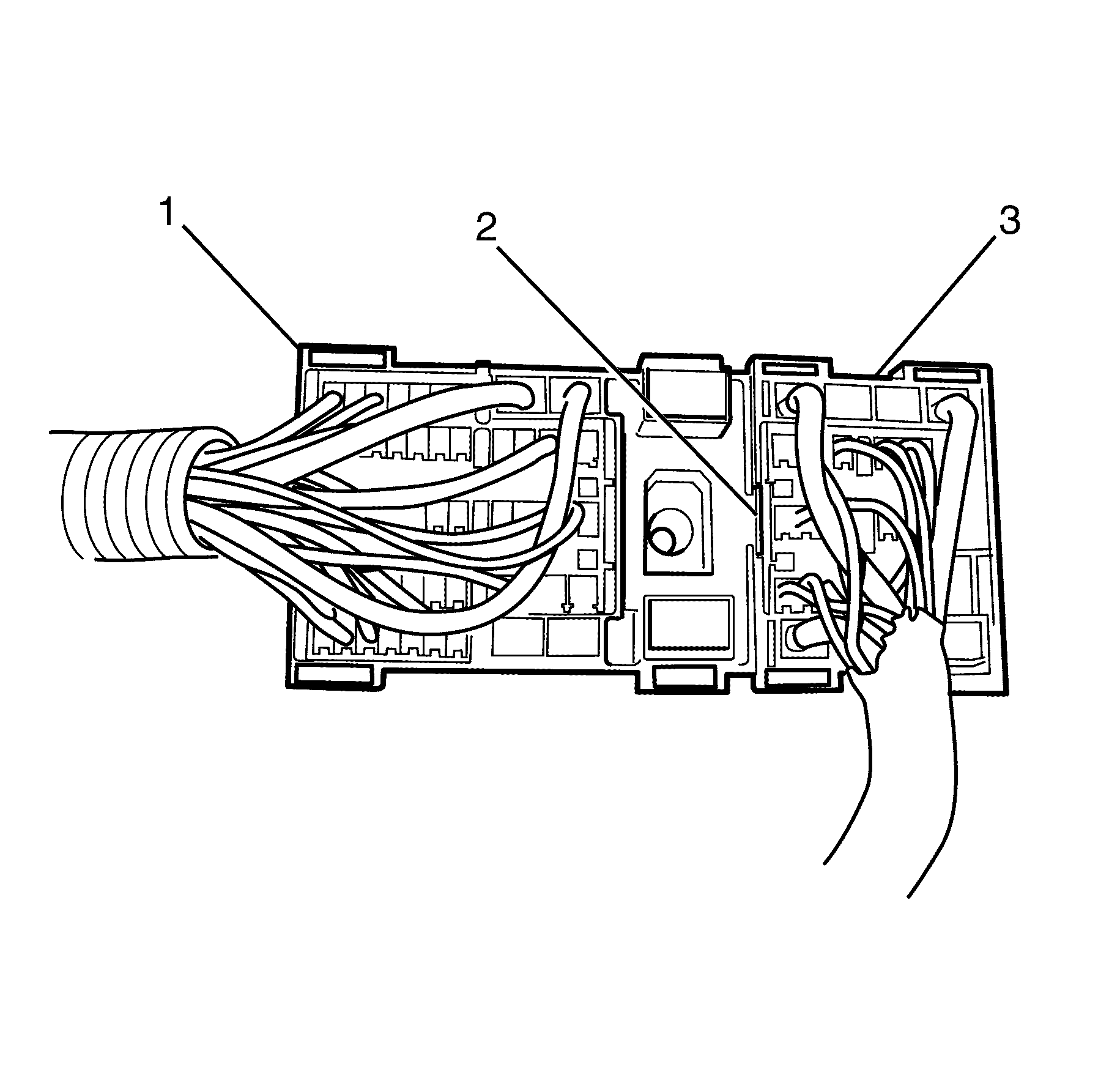
Note: Use a suitable tool to depress the connector locking tang (2), then pull the body harness connector (1) upward and the engine connector (3) downward to separate the body harness connector (1) from the engine connector (3).
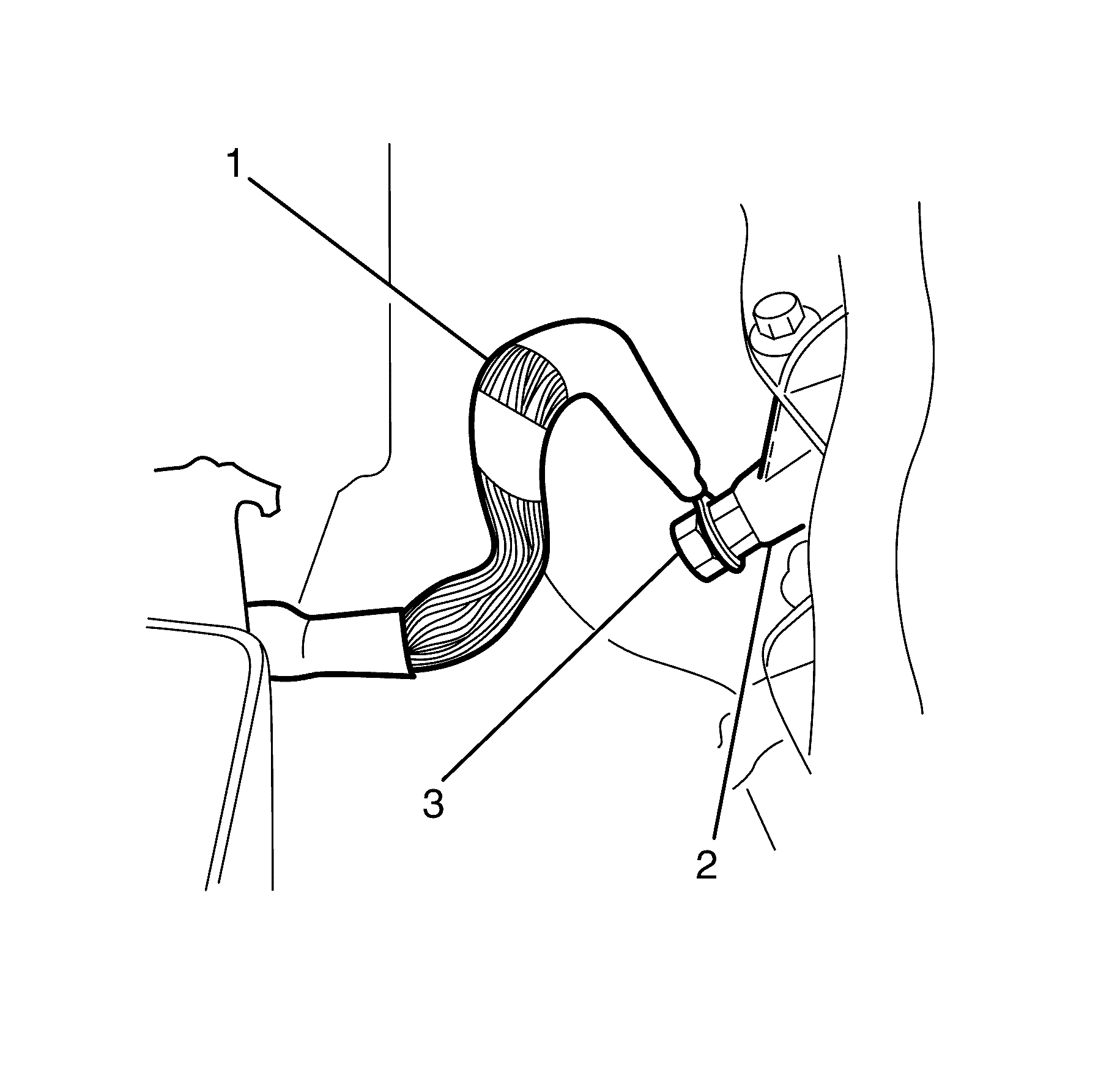
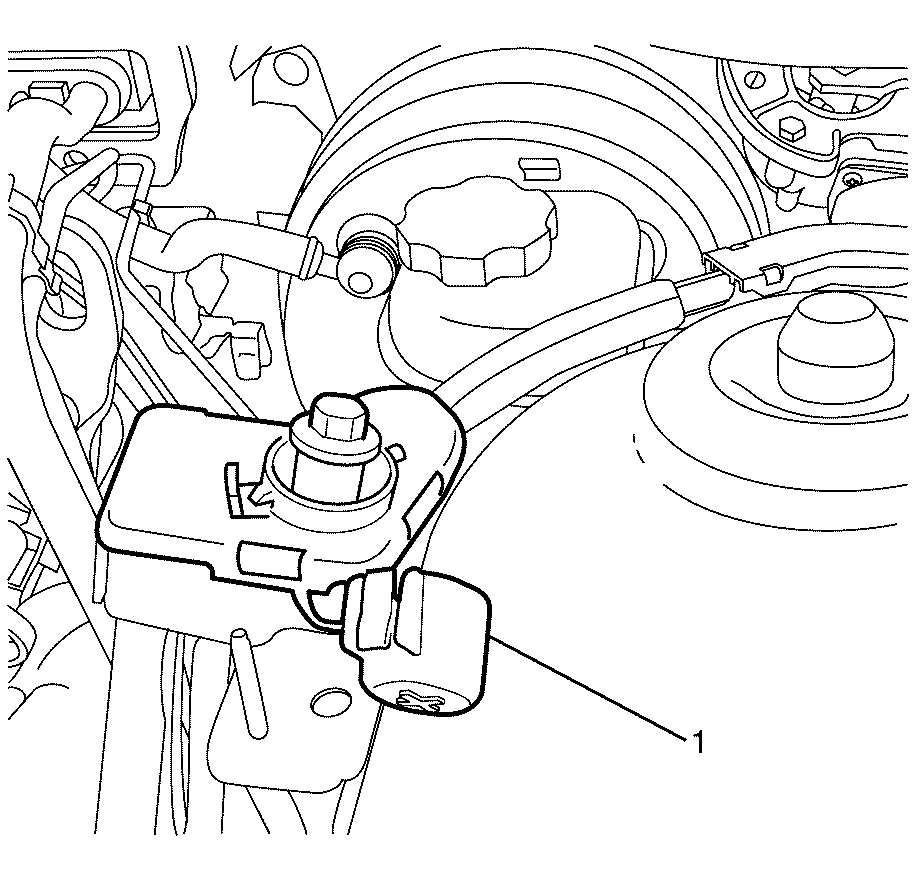
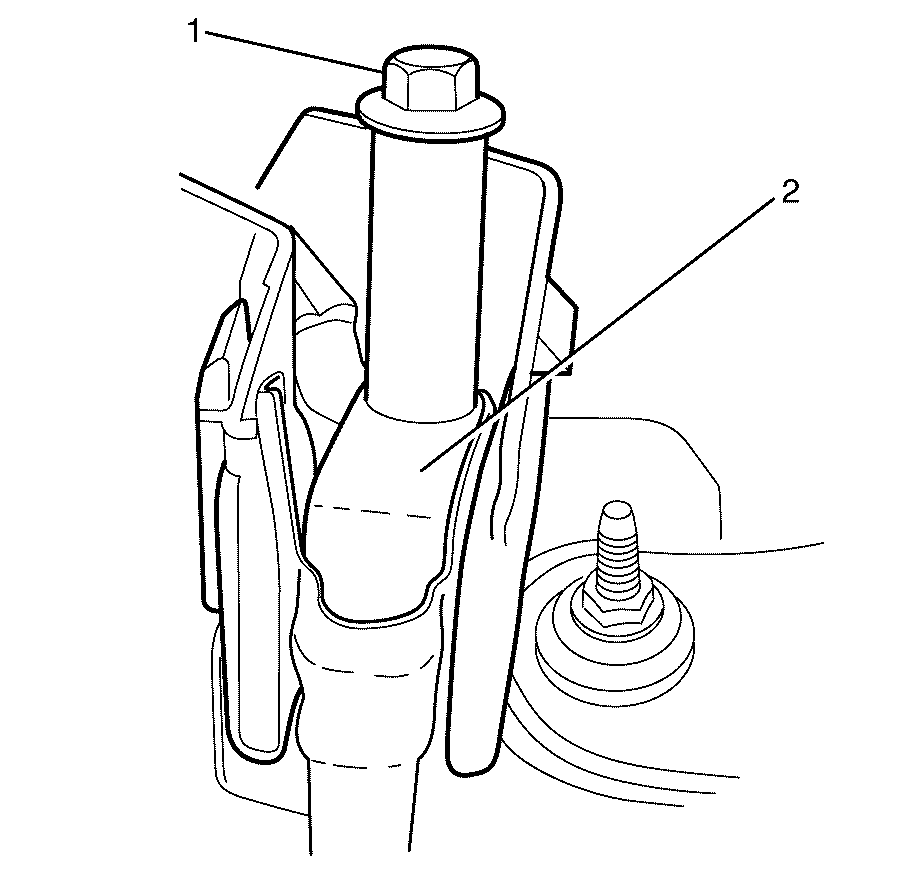
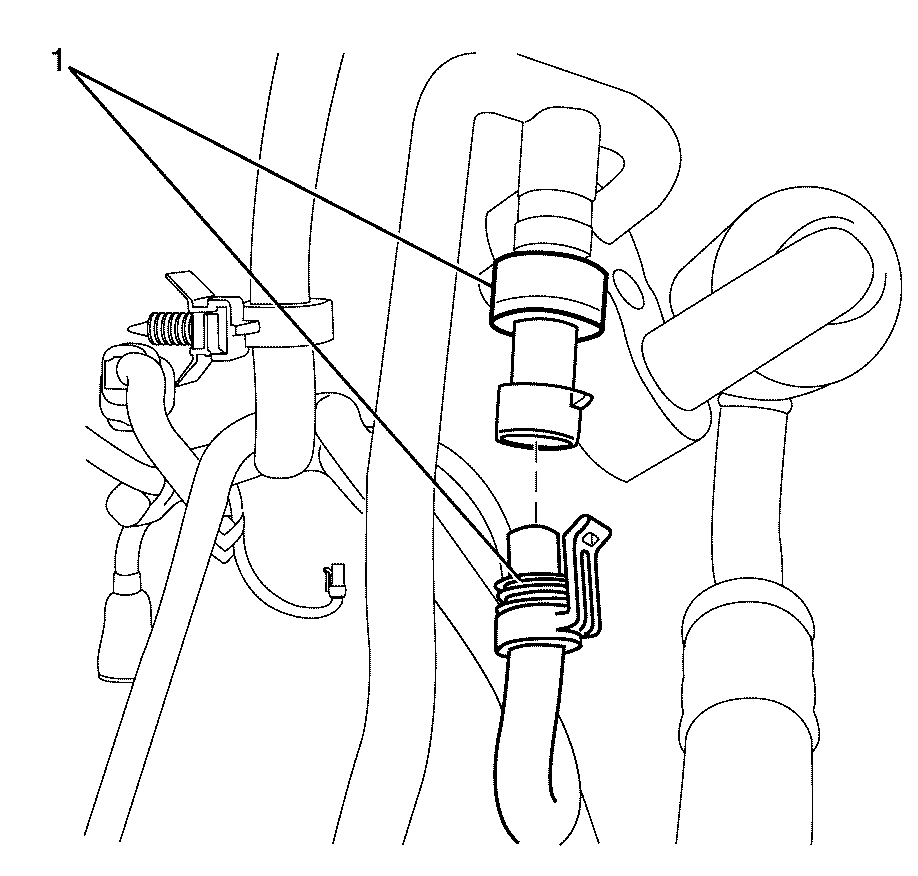
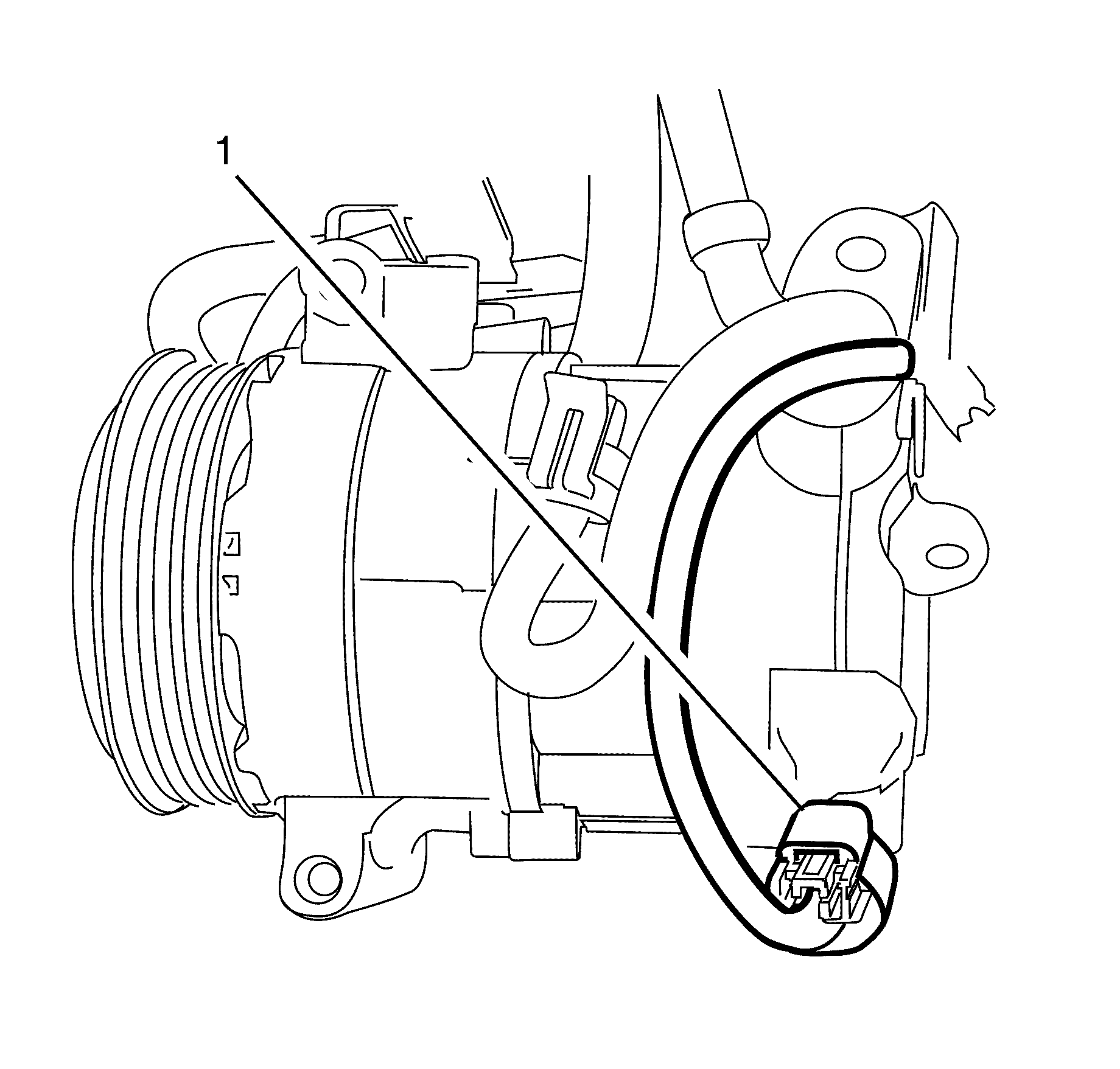
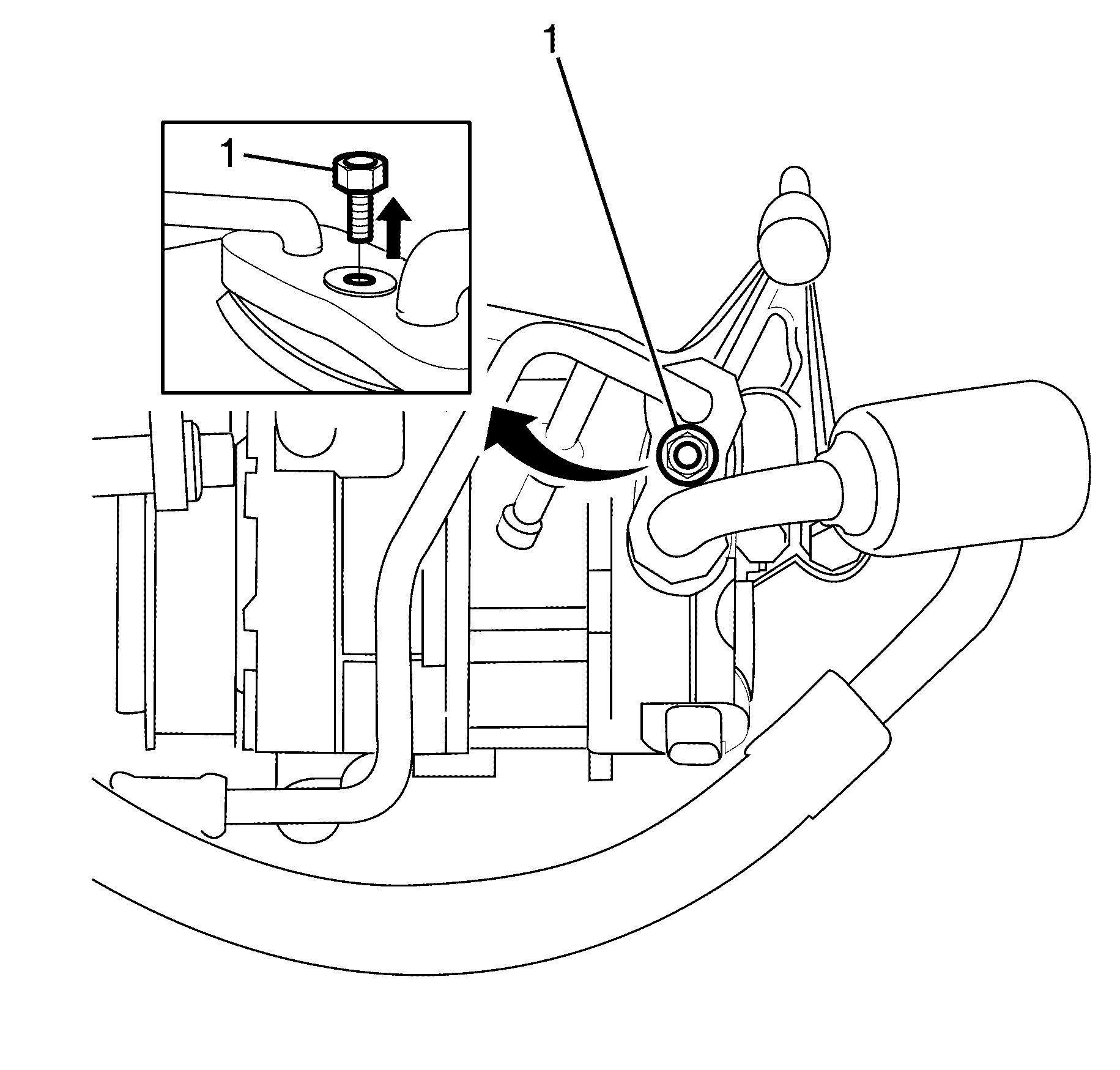
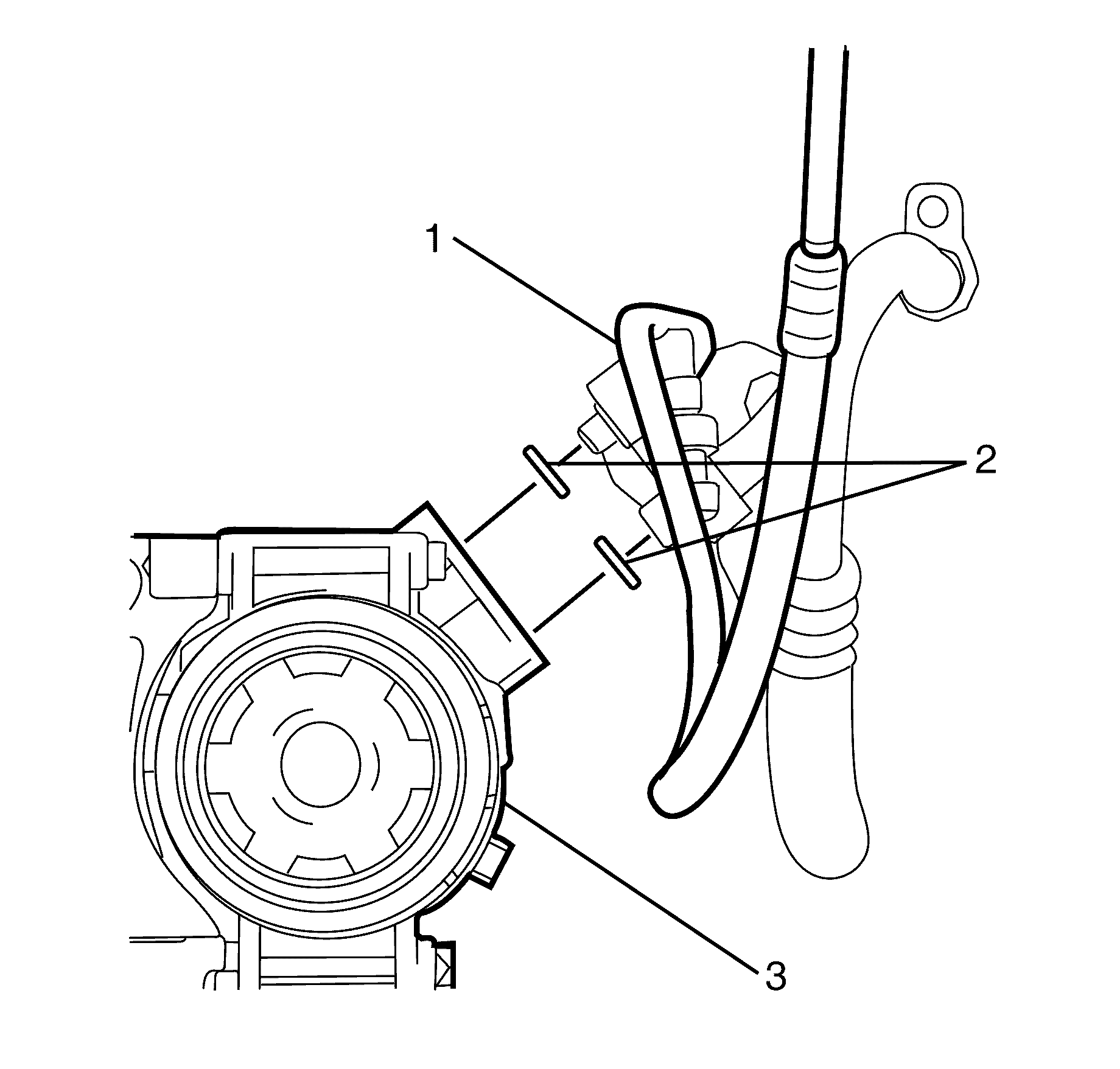
Note: Plug or cap the A/C suction/discharge pipe ends and the compressor ports immediately to prevent contamination and absorption of moisture from the atmosphere.
Note: The A/C sealing O-rings (2) are a single use component and will not reseal. Install NEW A/C sealing O-rings (2) whenever the A/C suction/discharge line pad (1) is removed from the A/C compressor (3).
Discard the O-rings (2).

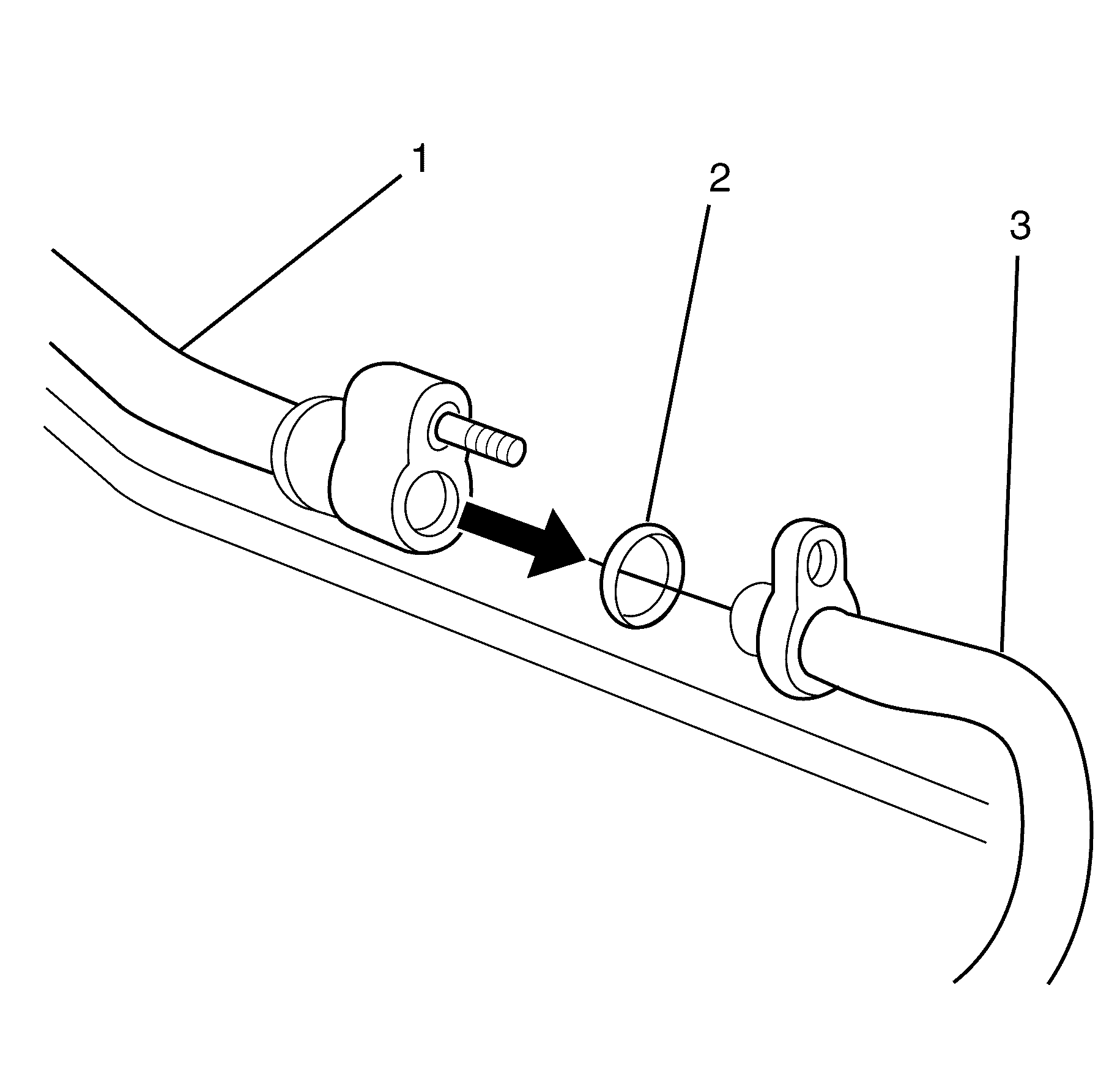
Note: Plug or cap the A/C suction pipe ends (1 and 3) immediately to prevent contamination and absorption of moisture from the atmosphere.
Note: The A/C suction pipe sealing O-ring (2) is a single use component and will not reseal. Install a NEW A/C suction pipe sealing O-ring (2) whenever the upper A/C suction pipe (1) is removed from the lower A/C suction pipe (3).
Discard the O-ring (2).
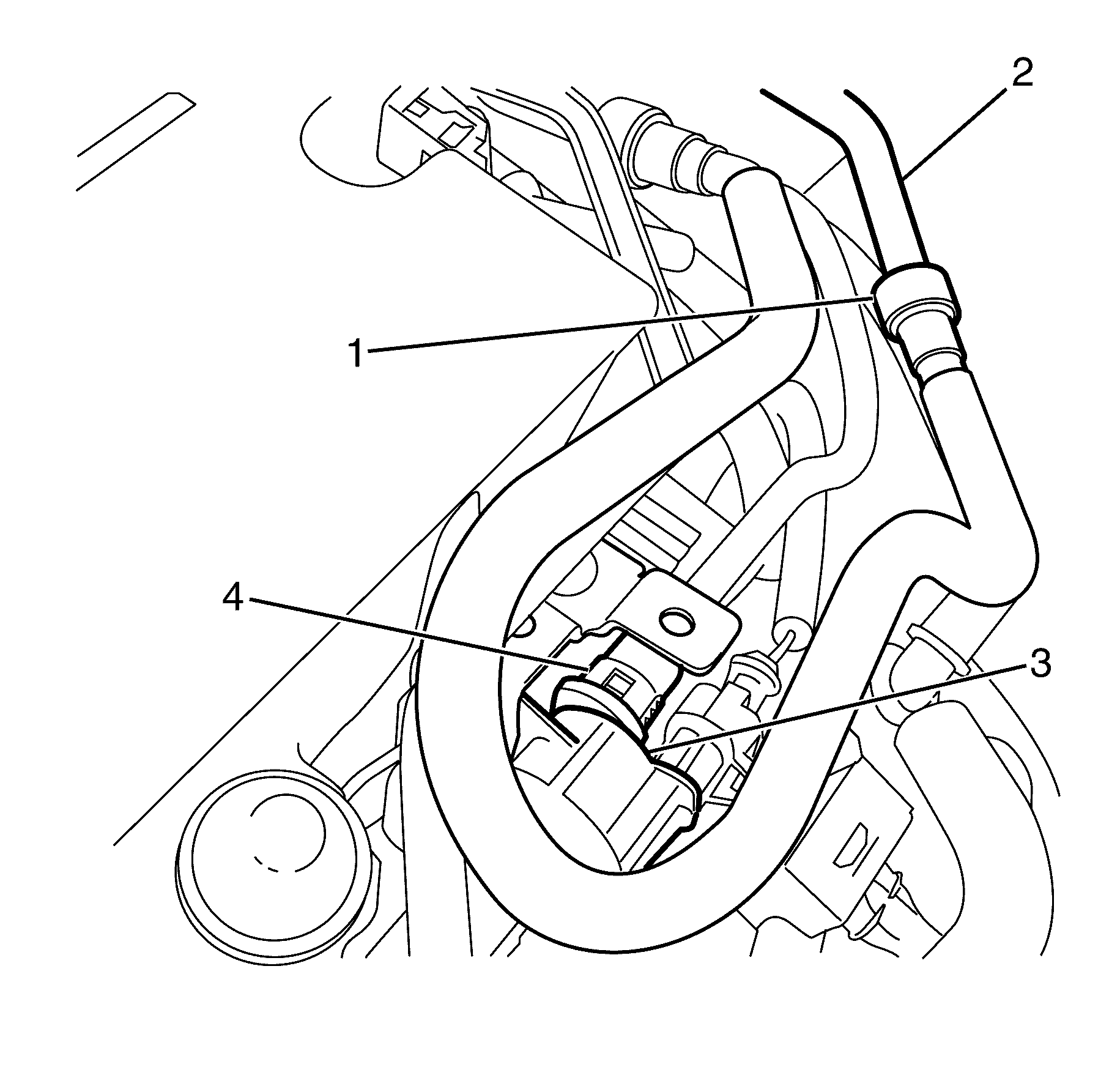
Note: Plug or cap the fuel feed pipe (2) and fuel feed hose (1) ends to prevent fuel leaks and/or contamination.
Note: The flexible hoses are not serviced separately. Therefore if the hose's require replacement, then the hose and radiator to hose cooler hose assembly must be fitted.
Note: When removal is complete plug hose openings with a clean lint free cloth to prevent foreign matter entry.
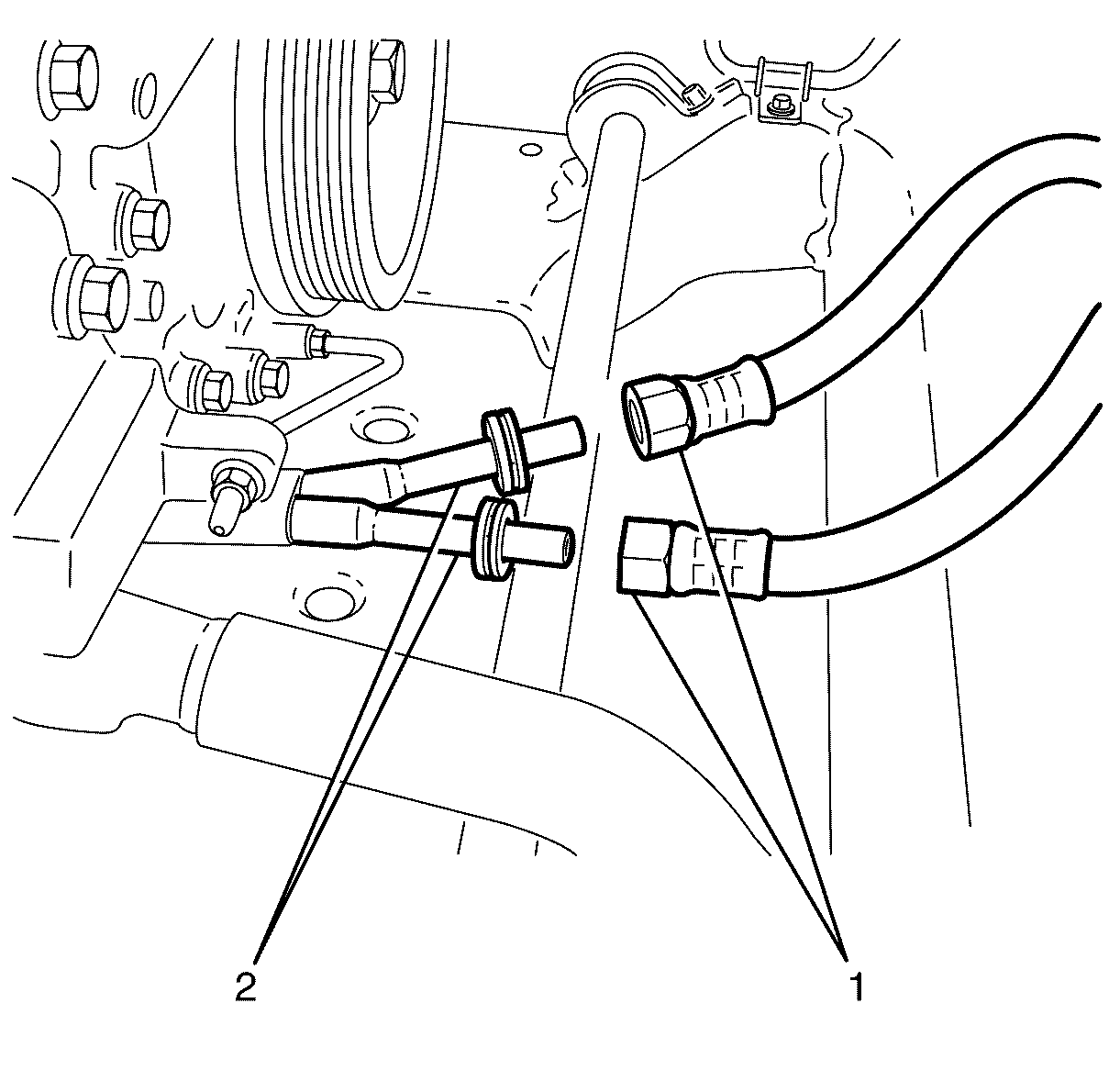
| • | Open release tool AU525 then close and clip around the hose to be disconnected. |
| • | While holding the flexible hose (1) push the hose inwards with one hand, then pull back to separate from the steel hose piping (2). |
| • | Repeat for the second fitting. |
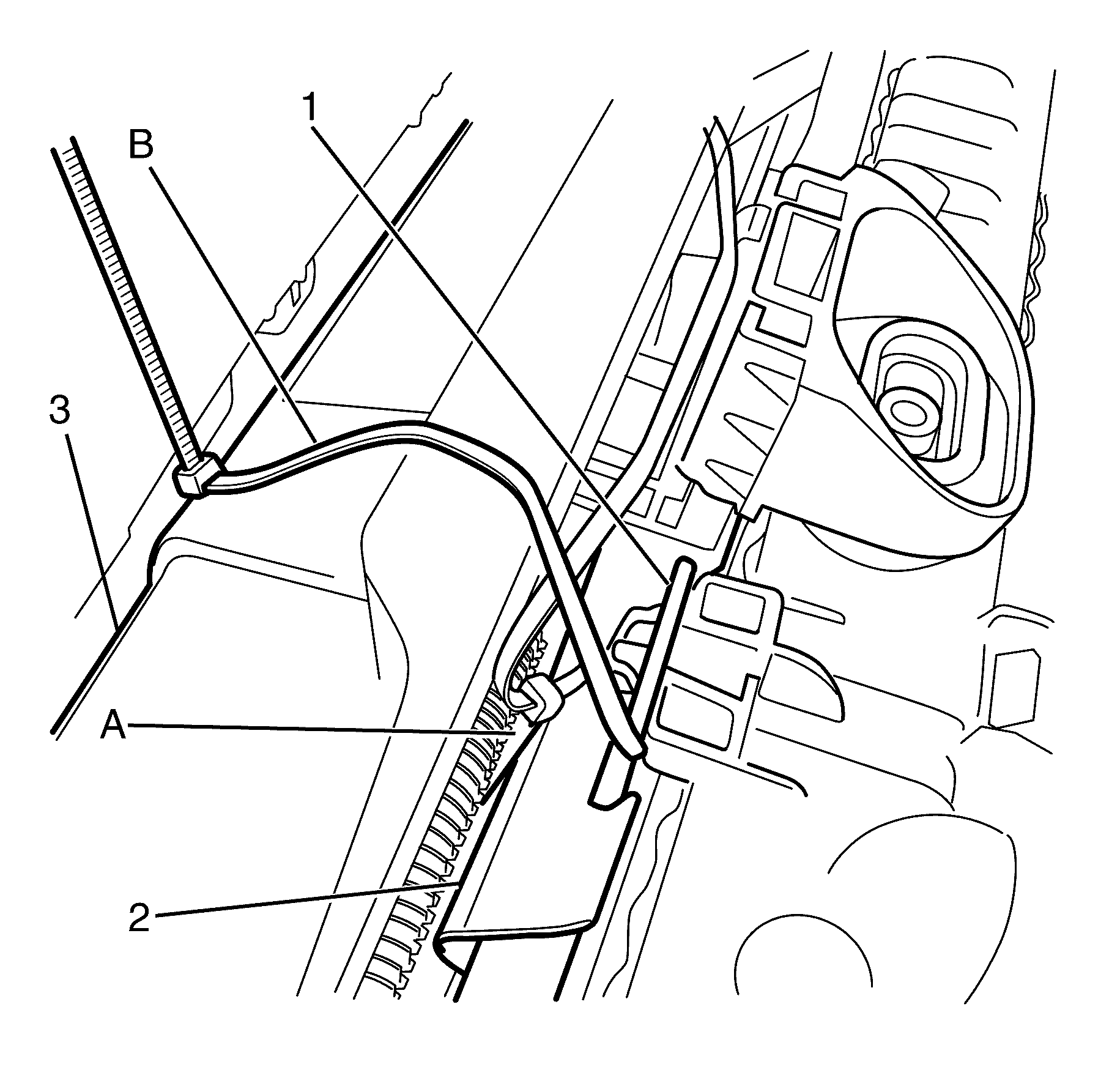
Note: It is necessary to secure the radiator and condenser assembly (2) to the front end assembly (3) as the radiator and condenser assembly is supported to the subframe.
Note: Thread zip tie A around the front end assembly and zip tie B through the radiator and condenser mount (1). Insert zip tie A into the retainer of zip tie B and insert zip tie B into the retainer of zip tie A.
Warning: Refer to Safety Glasses Warning in the Preface section.
Danger: To avoid any vehicle damage, serious personal injury or death when major components are removed from the vehicle and the vehicle is supported by a hoist, support the vehicle with jack stands at the opposite end from which the components are being removed and strap the vehicle to the hoist.
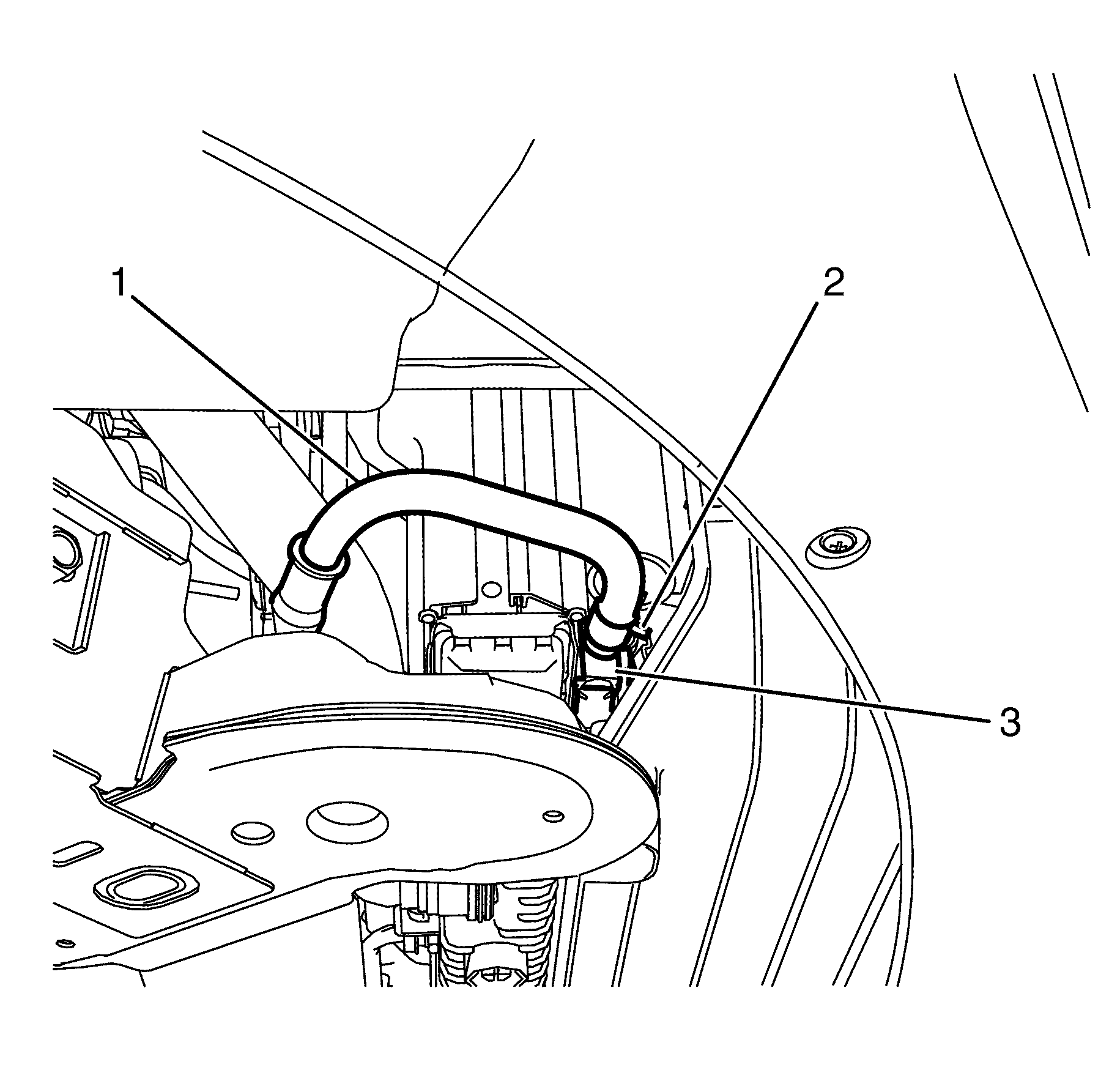
Note: The power steering cooler (3) must be plugged to prevent the entry of foreign particles into the power steering system.
Plug the power steering cooler (3) and power steering gear outlet hose (1).
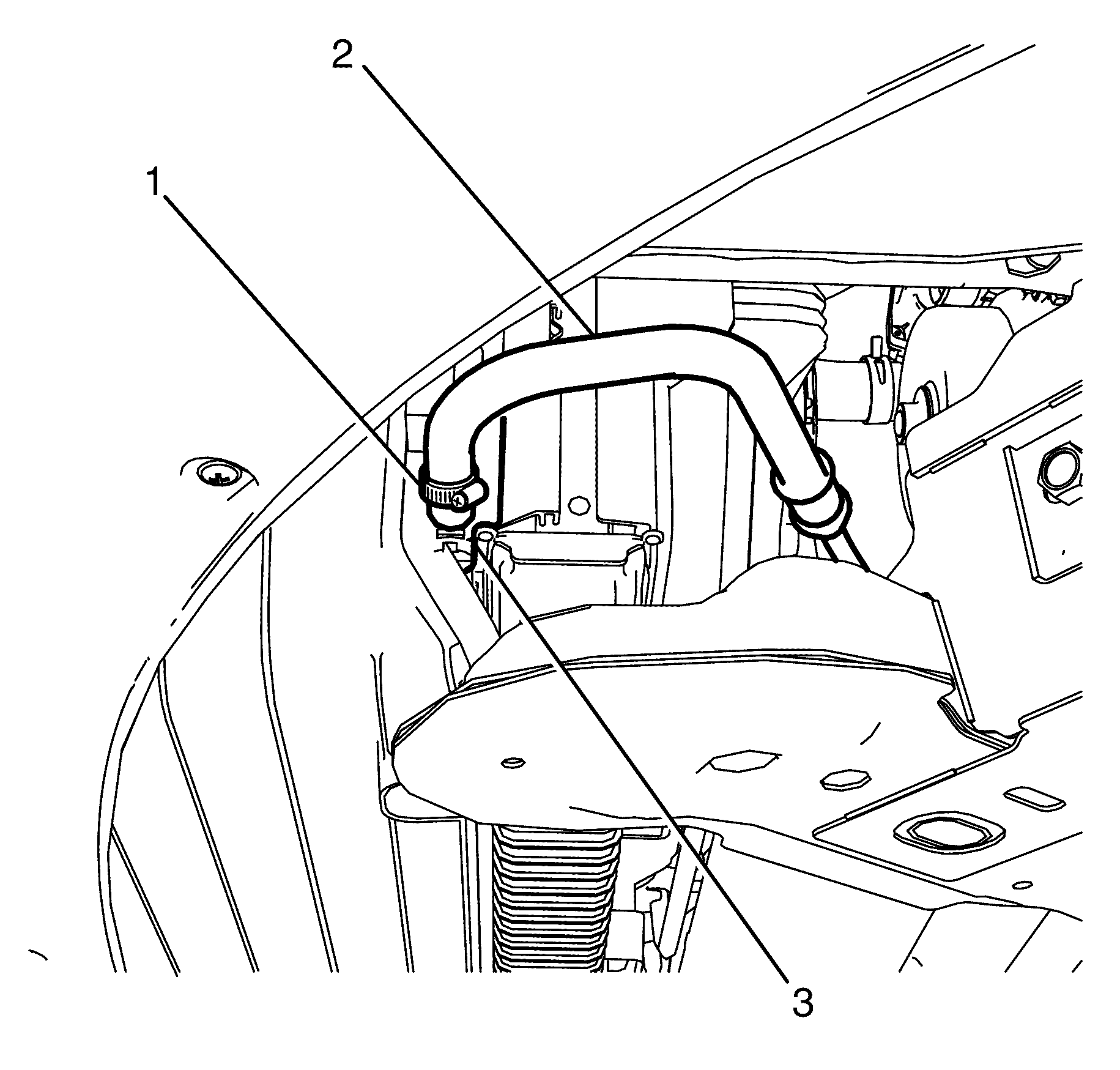
Note: The power steering cooler (3) must be plugged to prevent the entry of foreign particles into the power steering system.
Plug the power steering cooler (3) and power steering reservoir inlet hose (2).
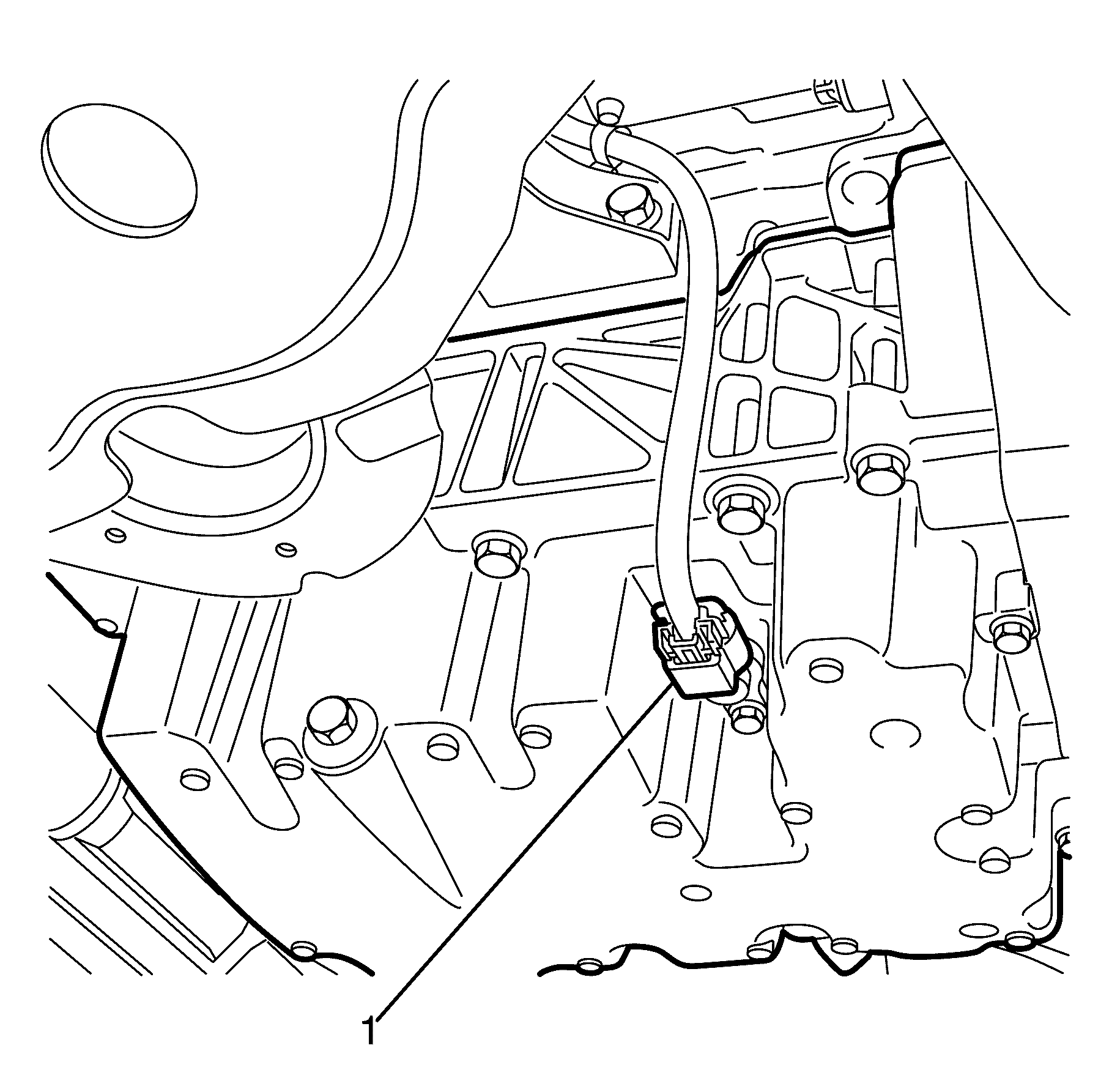

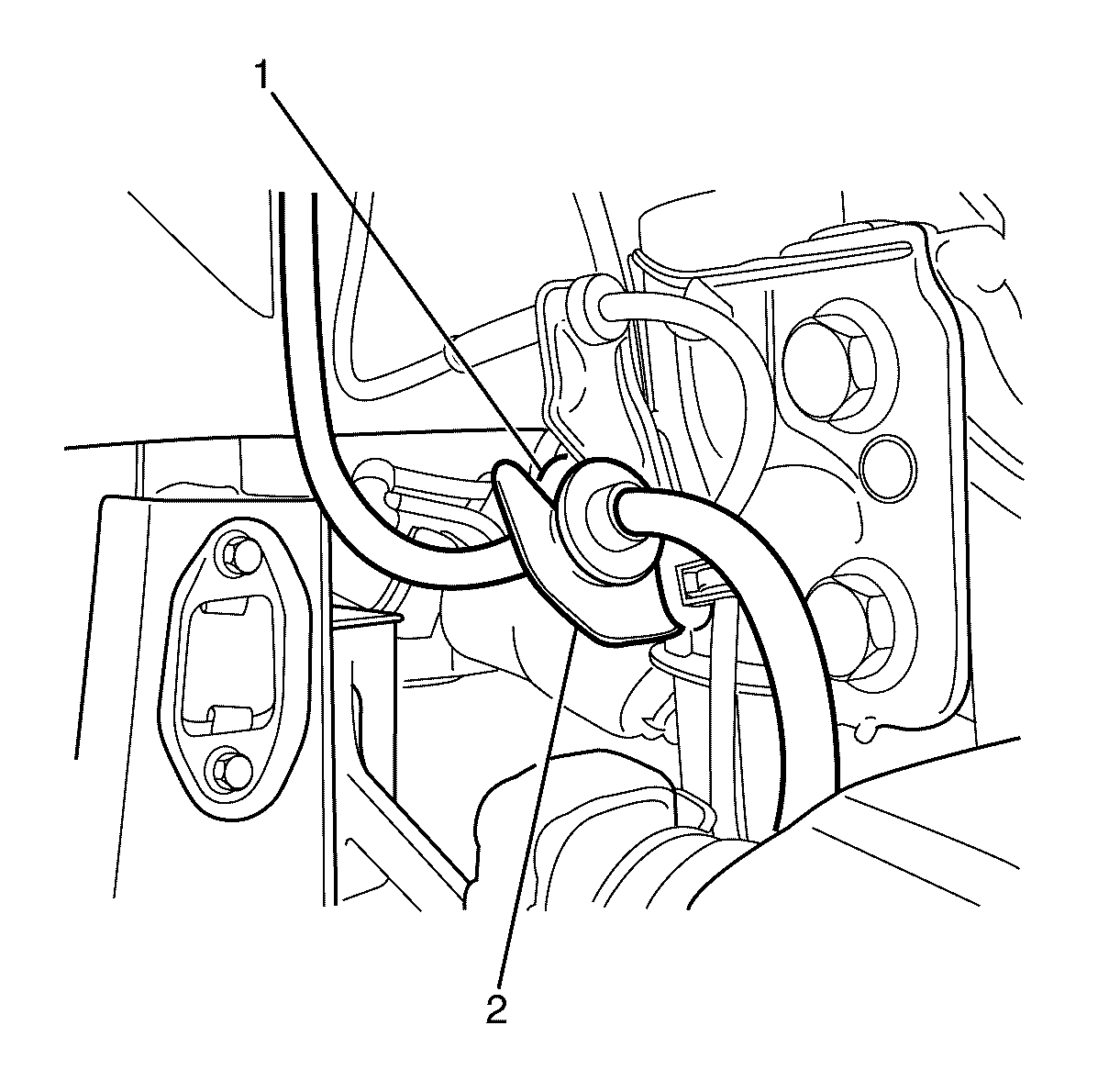
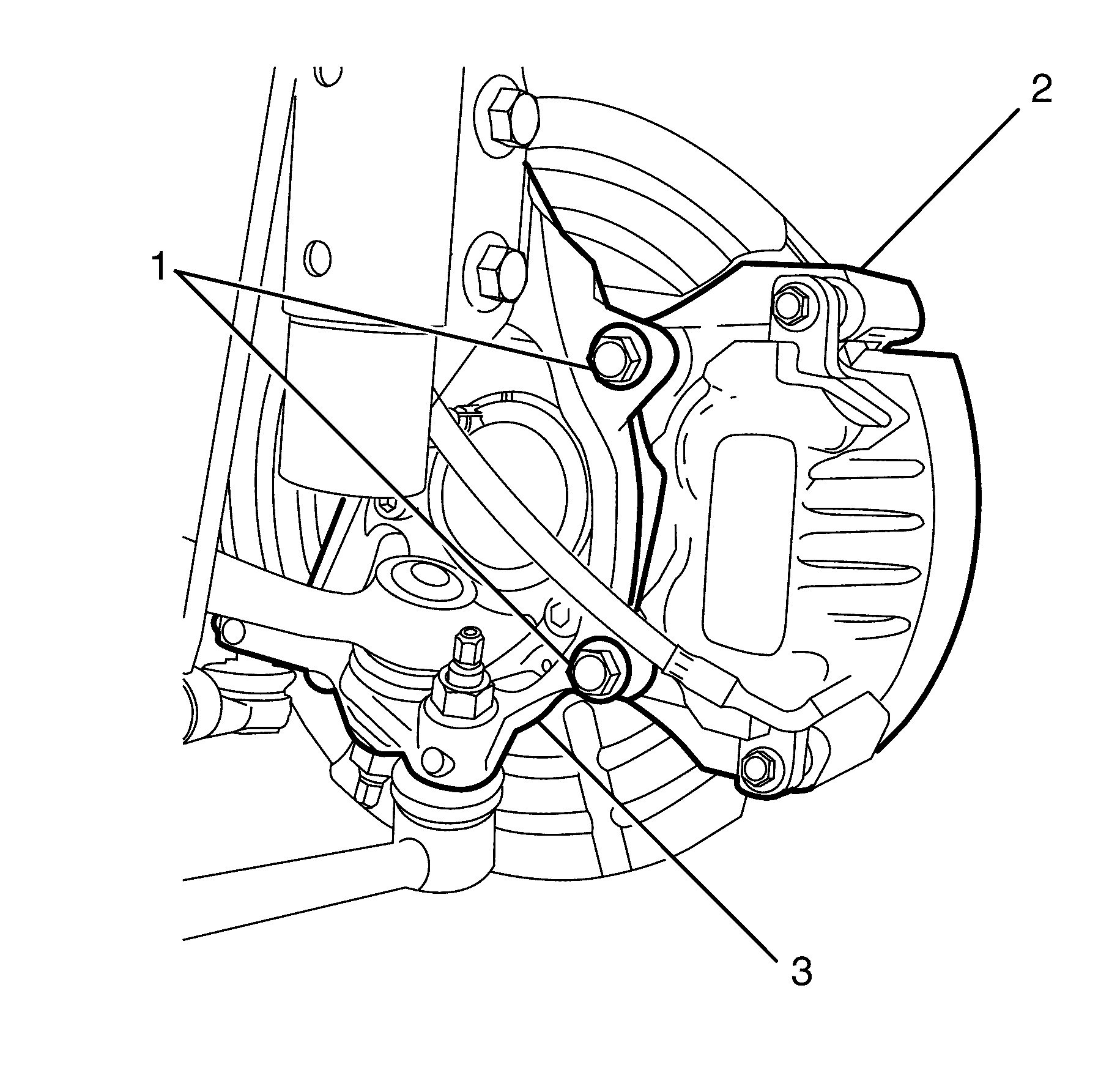
Note: Bolts with micro-encapsulated thread sealant must be discarded after removal.
Note: Make sure all the bolt holes are thoroughly cleaned and all micro-encapsulated thread sealant is removed.
| • | Discard the bolts. |
| • | Clean the bolt holes. |
Important: DO NOT disconnect the hydraulic brake flexible hose from the brake caliper otherwise complete bleeding of the braking system will be necessary.
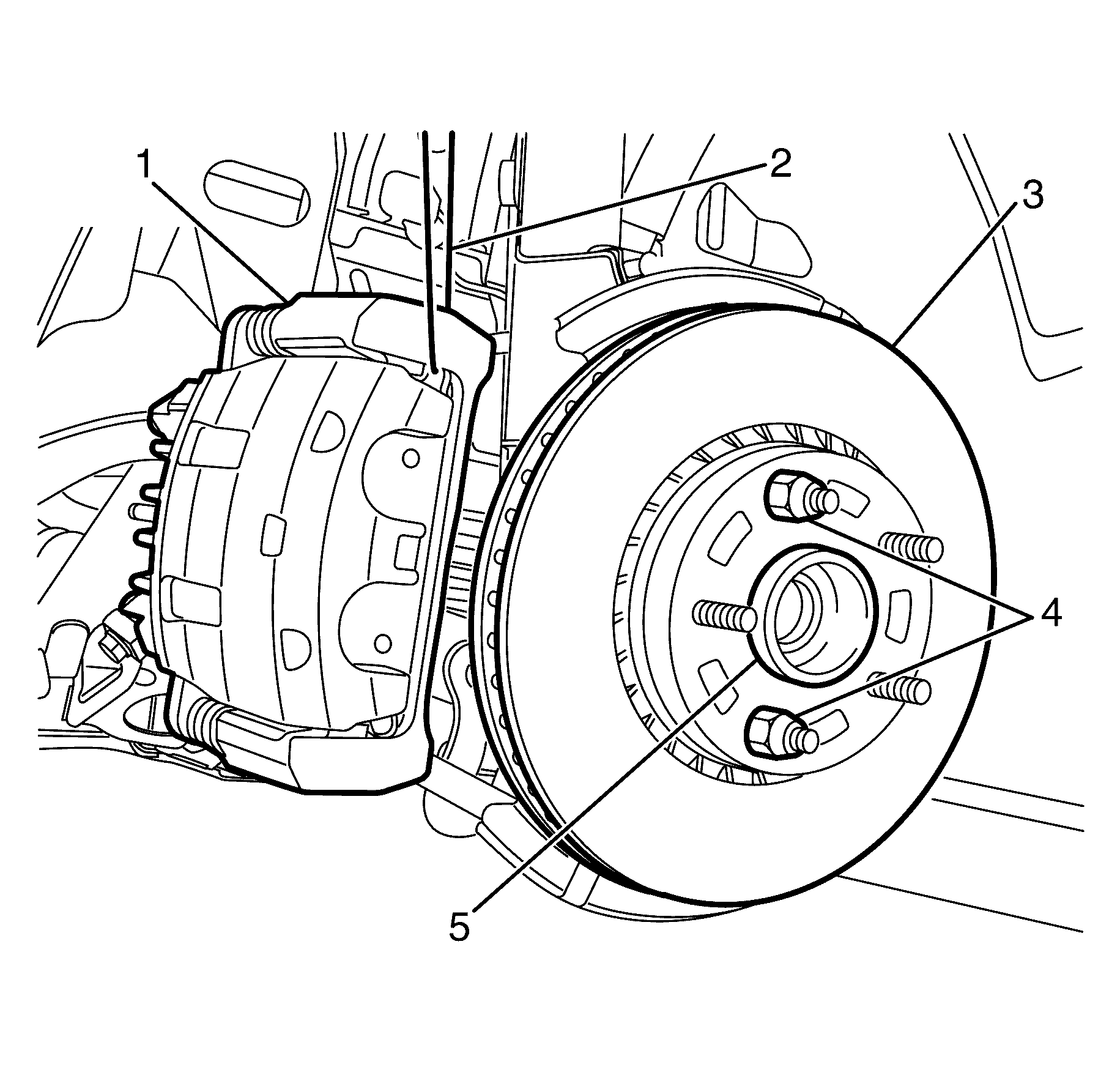
Caution: Support the brake caliper with heavy mechanic wire, or equivalent, whenever it is separated from its mount and the hydraulic flexible brake hose is still connected. Failure to support the caliper in this manner will cause the flexible brake hose to bear the weight of the caliper, which may cause damage to the brake hose and in turn may cause a brake fluid leak.
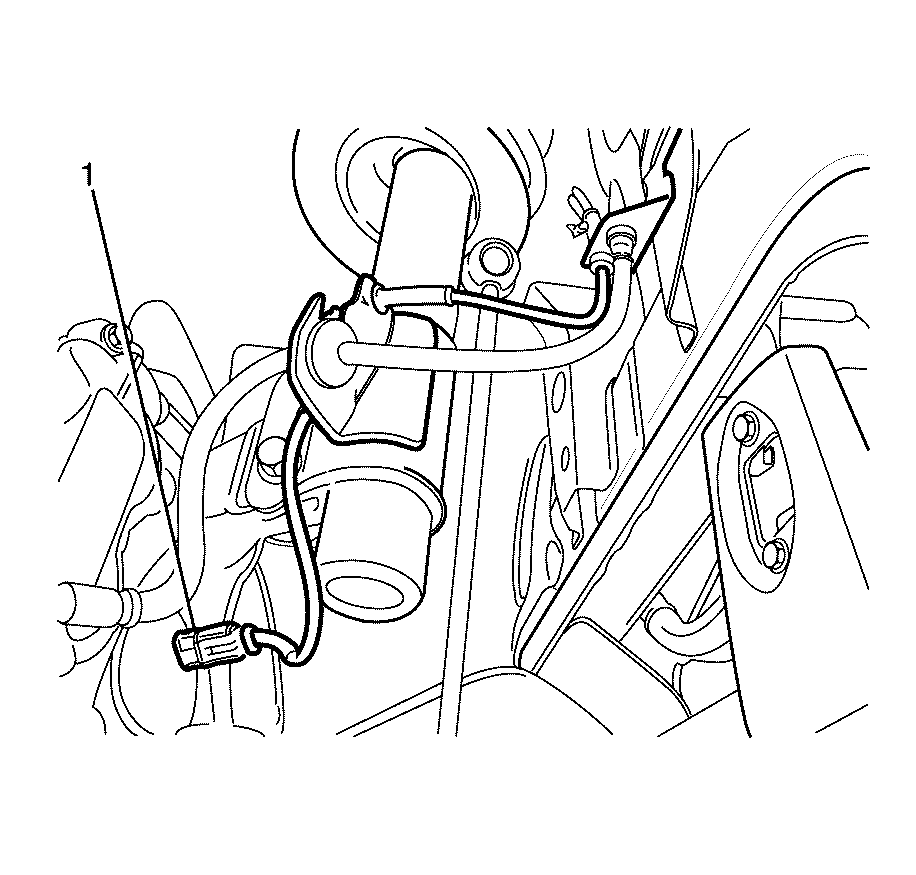
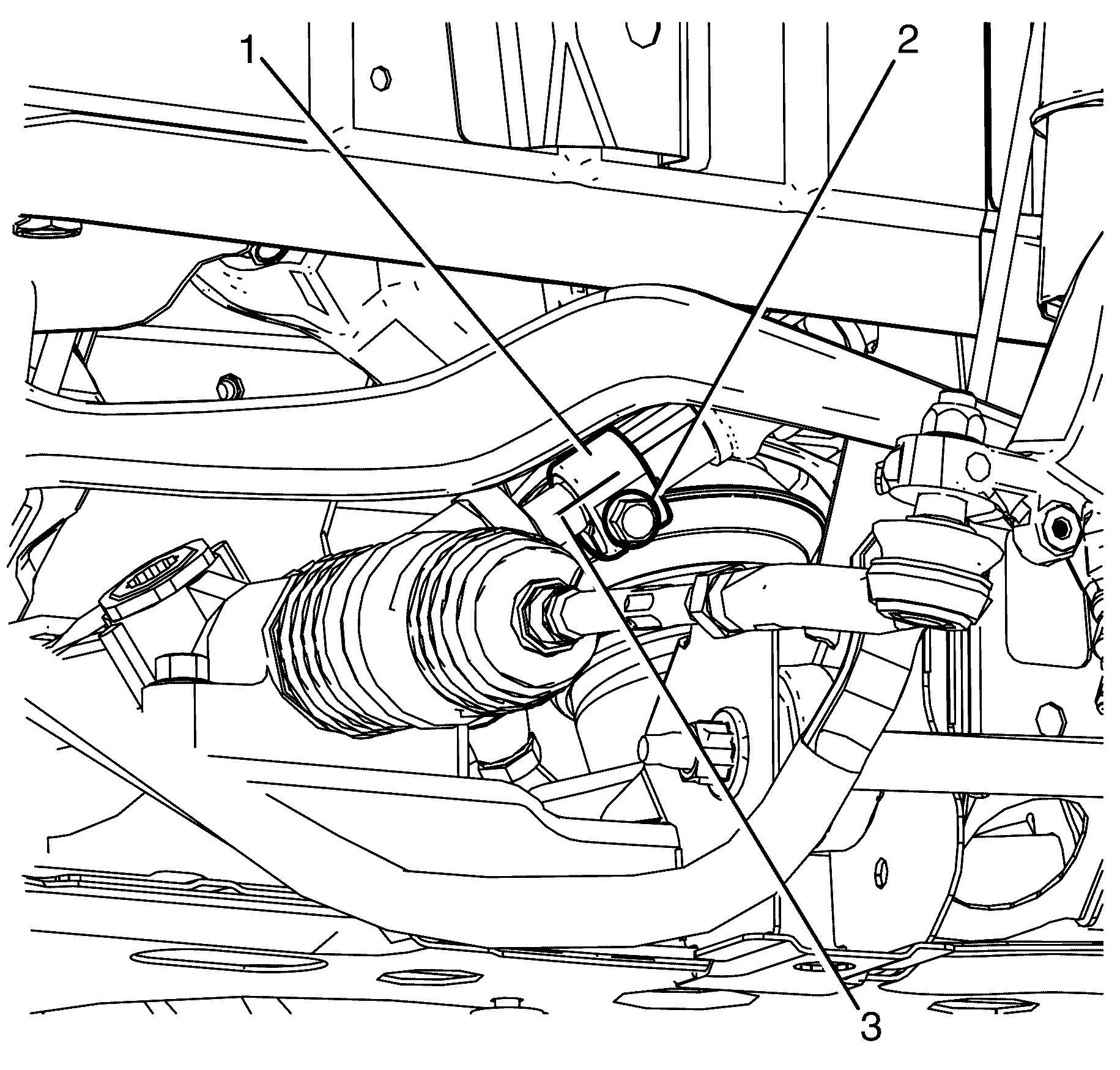
Note: The front wheels of the vehicle must be maintained in the straight ahead position and the steering column must be in the LOCK position before disconnecting the steering column or intermediate shaft. If these procedures are not followed incorrect alignment of some components during installation will result and damage to the SIR coil assembly will occur.
Note: Observing the orientation of the intermediate steering shaft (1) with reference to the pinion shaft (3) will minimize the potential of incorrect steering column assembly alignment.
Important: Bolts with micro-encapsulated thread sealant must be discarded after removal.
Important: Make sure the bolt hole is thoroughly cleaned and all micro-encapsulated thread sealant is removed.
| • | Discard the bolt. |
| • | Clean the bolt hole. |
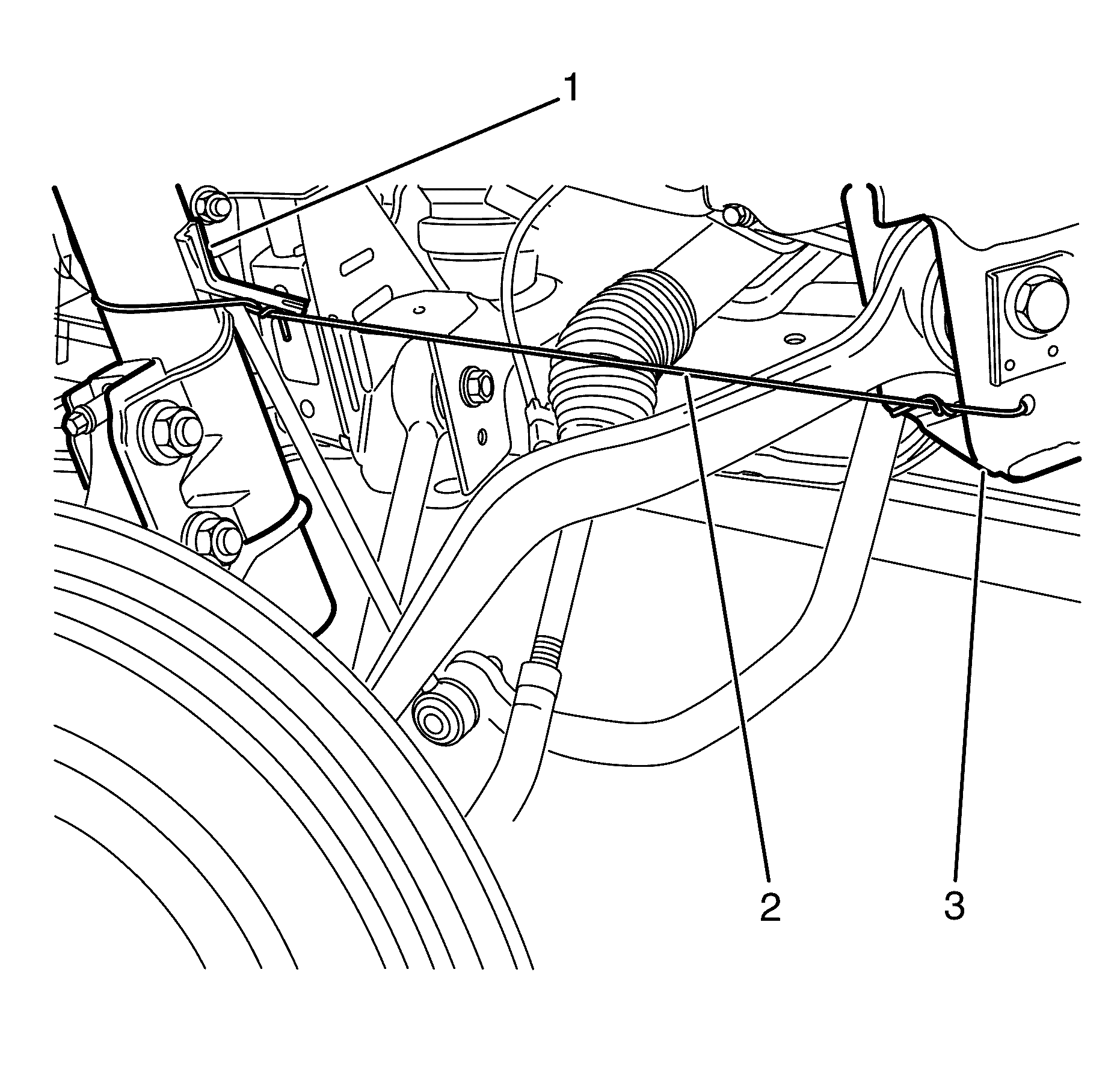
Note: The strut assembly (1) must be secured to the subframe (3) to prevent damage to the front wheelhouse liner, fenders and suspension components.
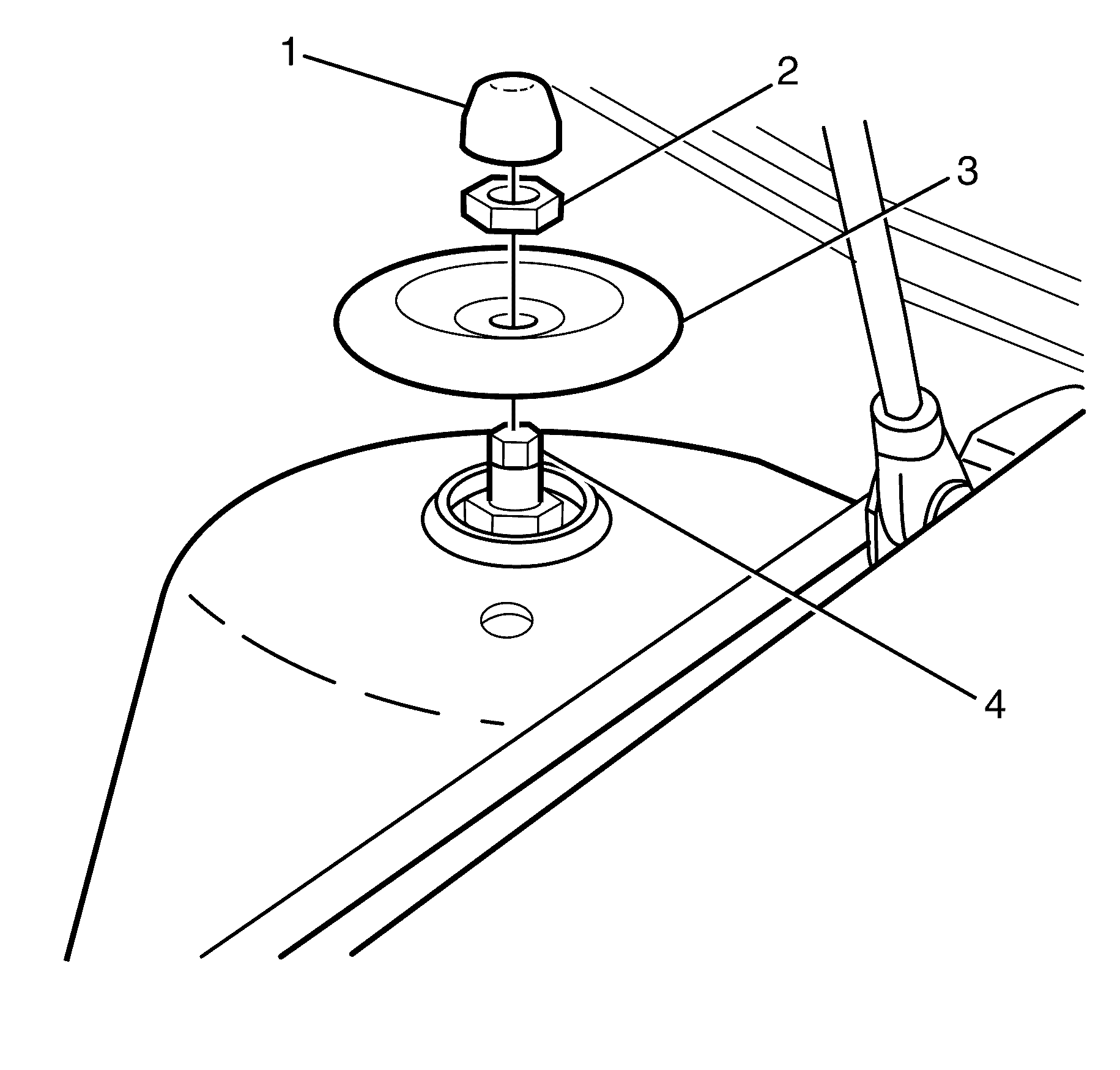
Note: The strut assembly (4) must be supported from underneath before the strut assembly to front wheelhouse retaining nut (2) is removed.
Discard the nut.
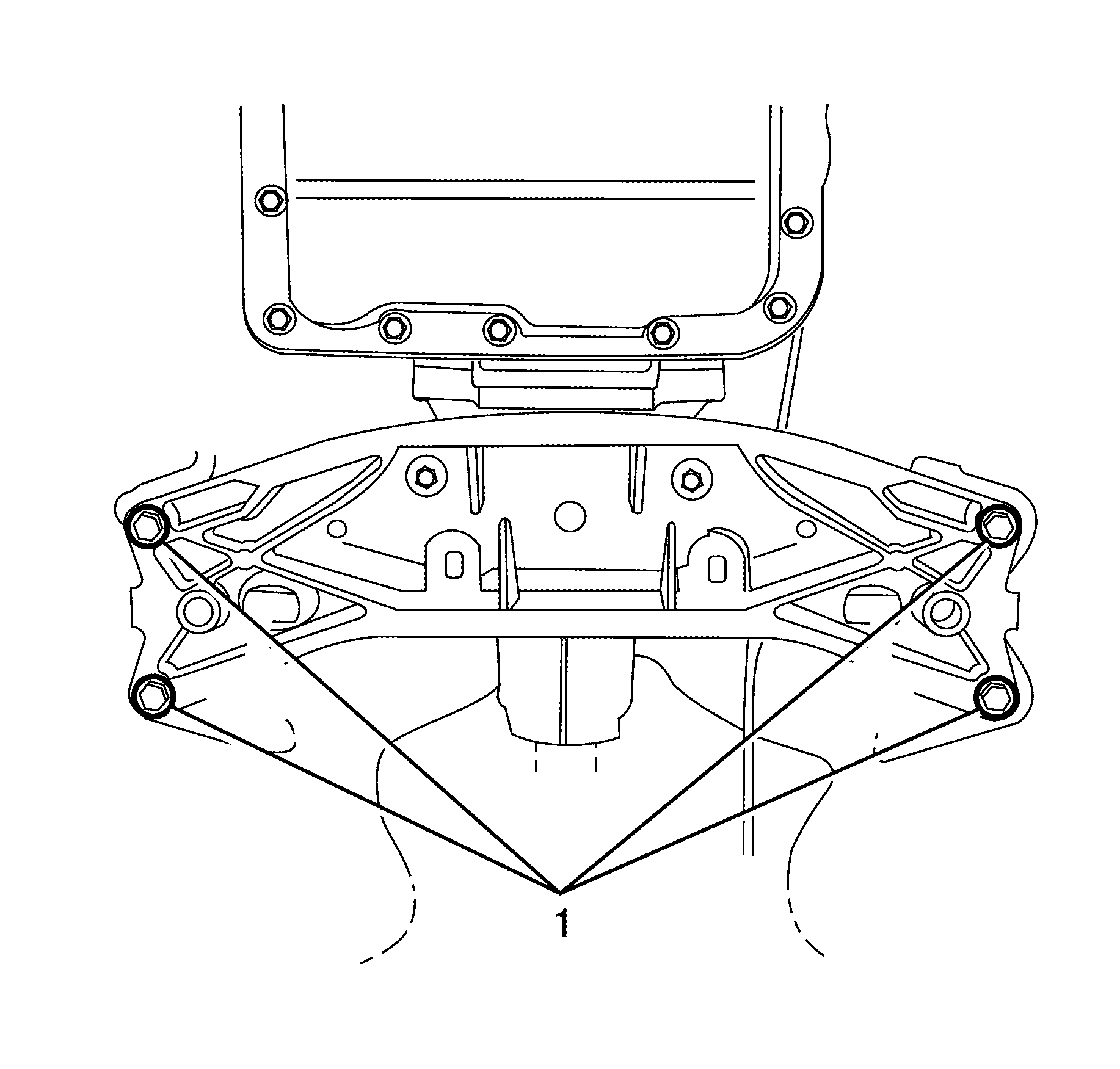
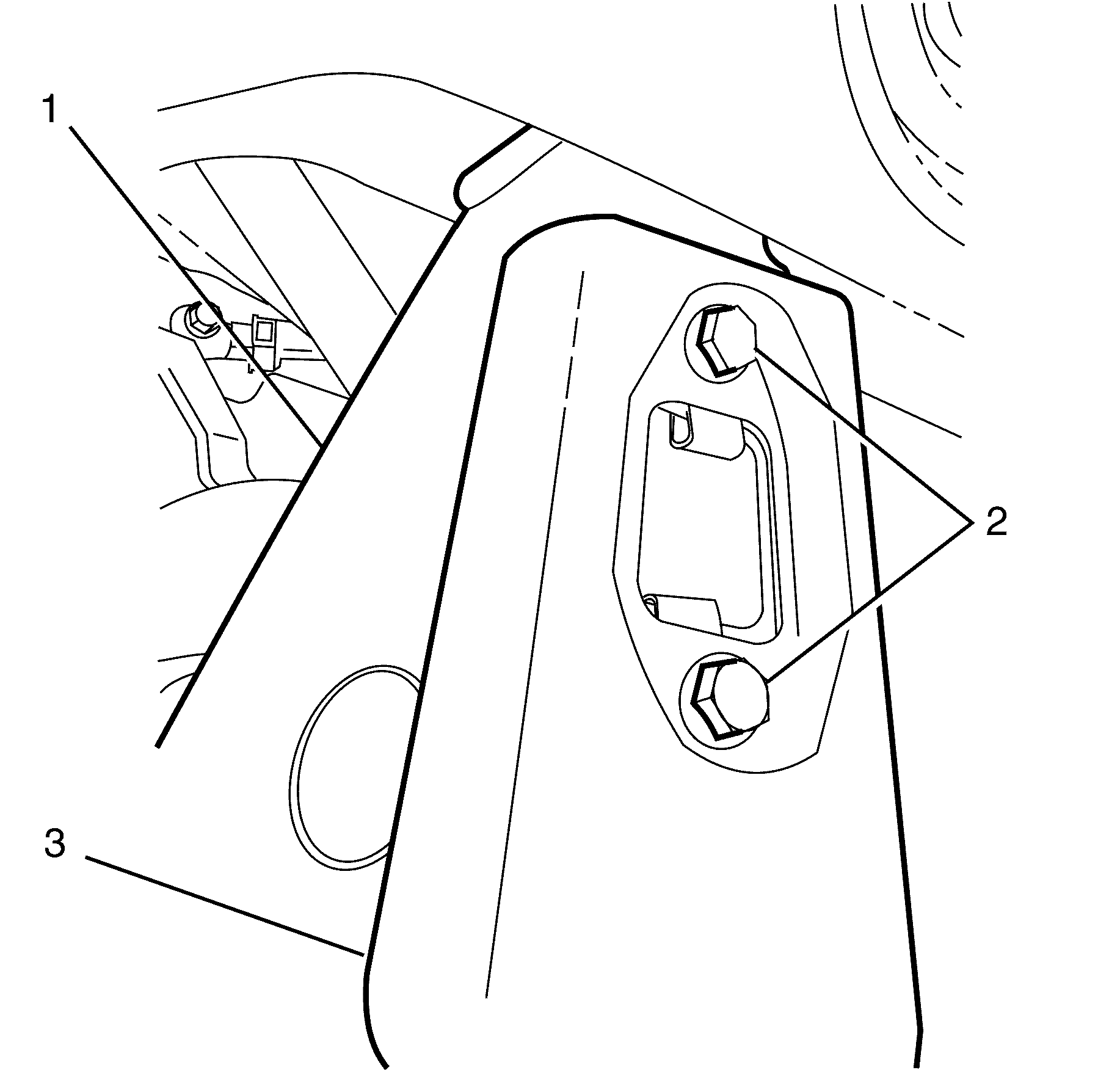
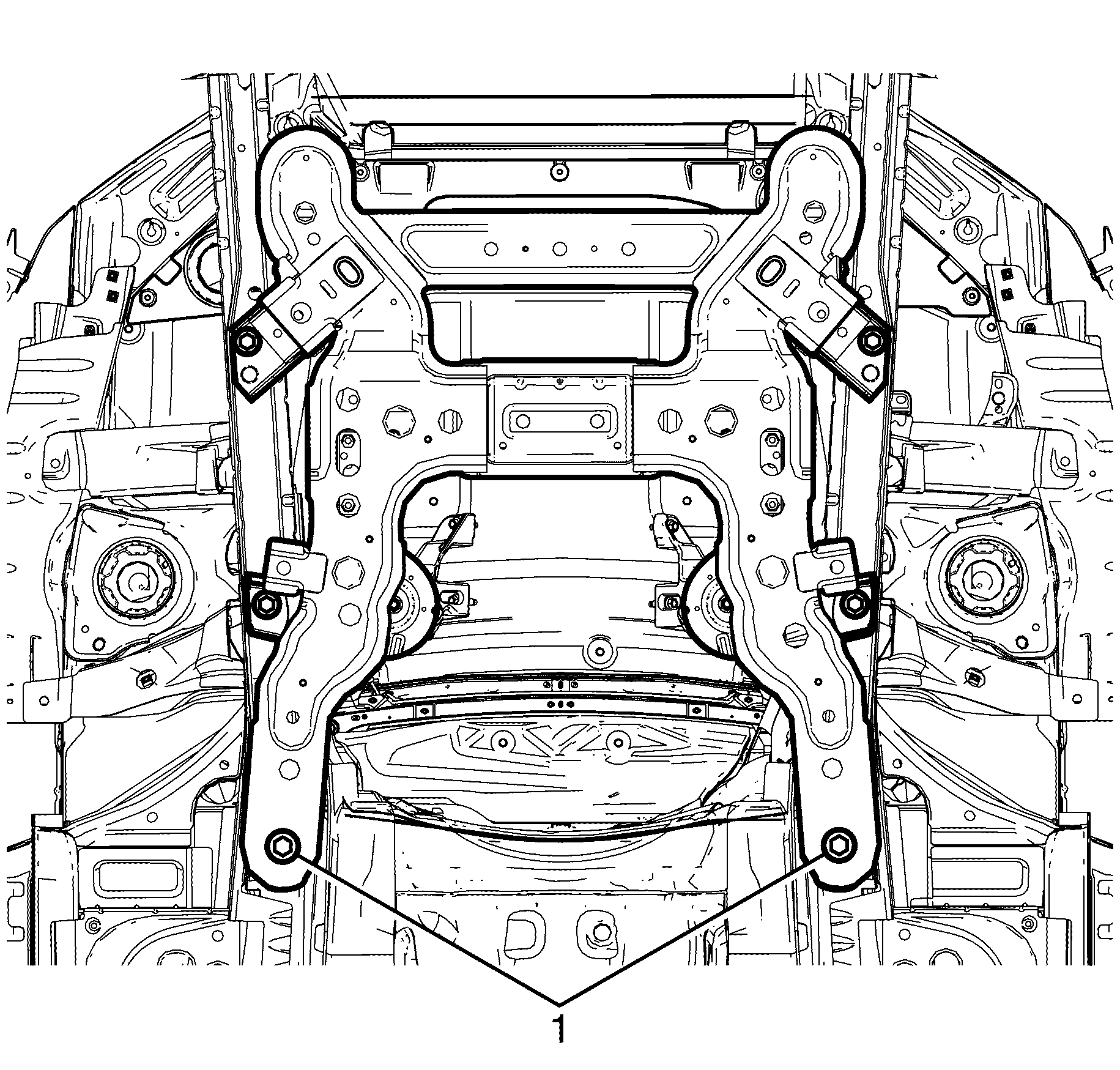
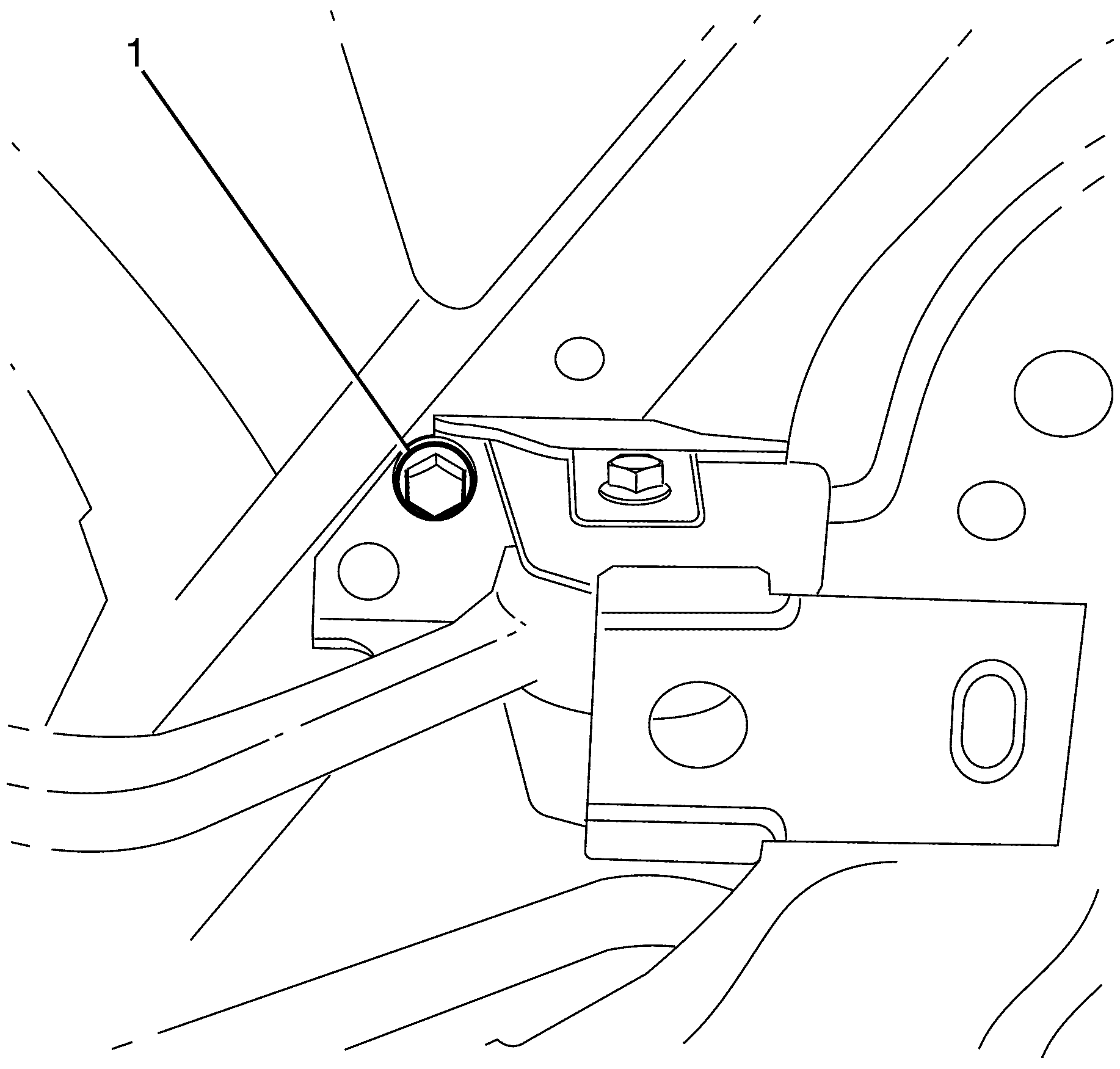
Note: Only right side depicted in graphic, left side similar.
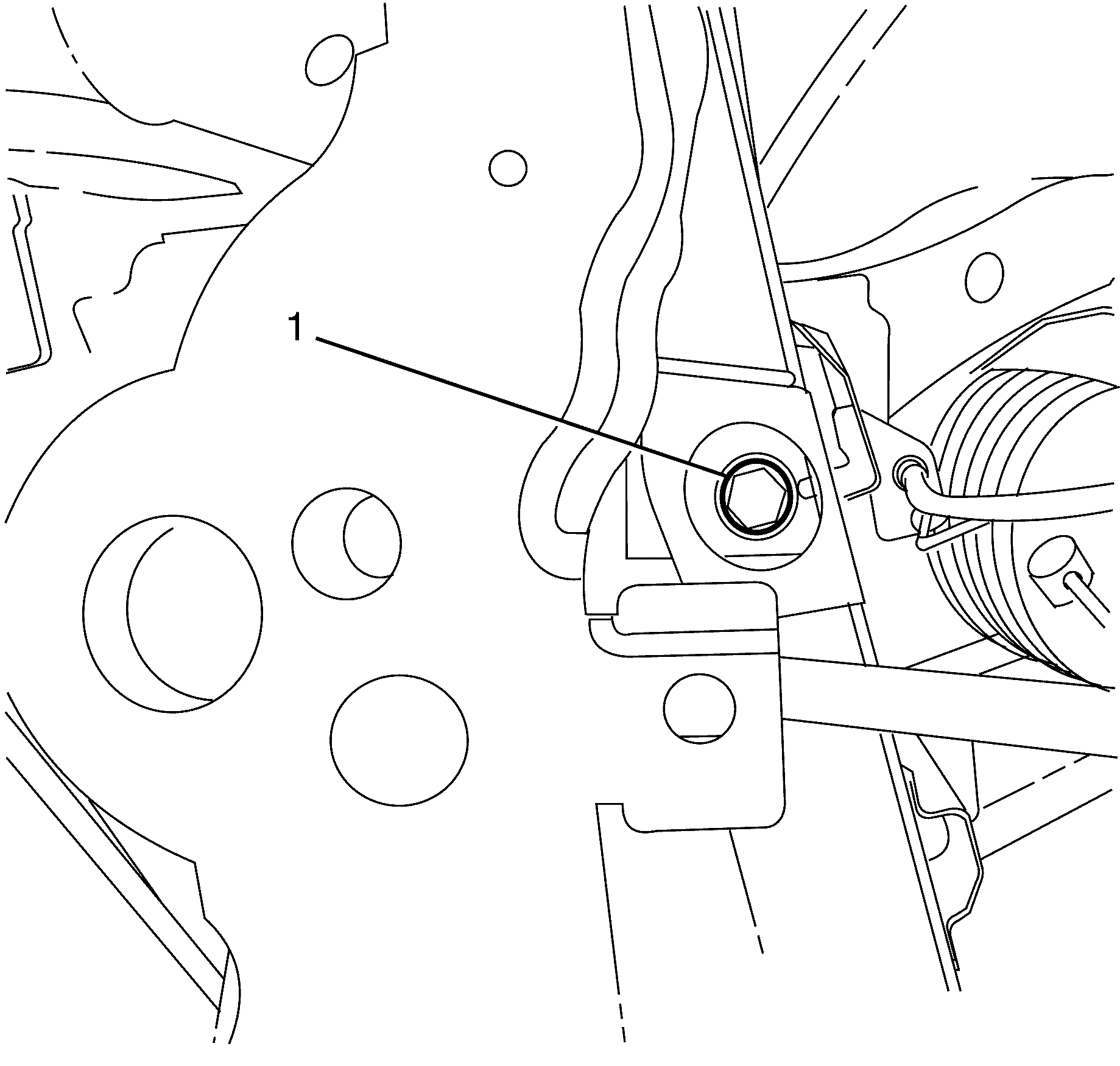
Note: Only right side depicted in graphic, left side similar.
Note: Make sure that all the hoses, wires, pipes and front struts clear the vehicle during the removal process.
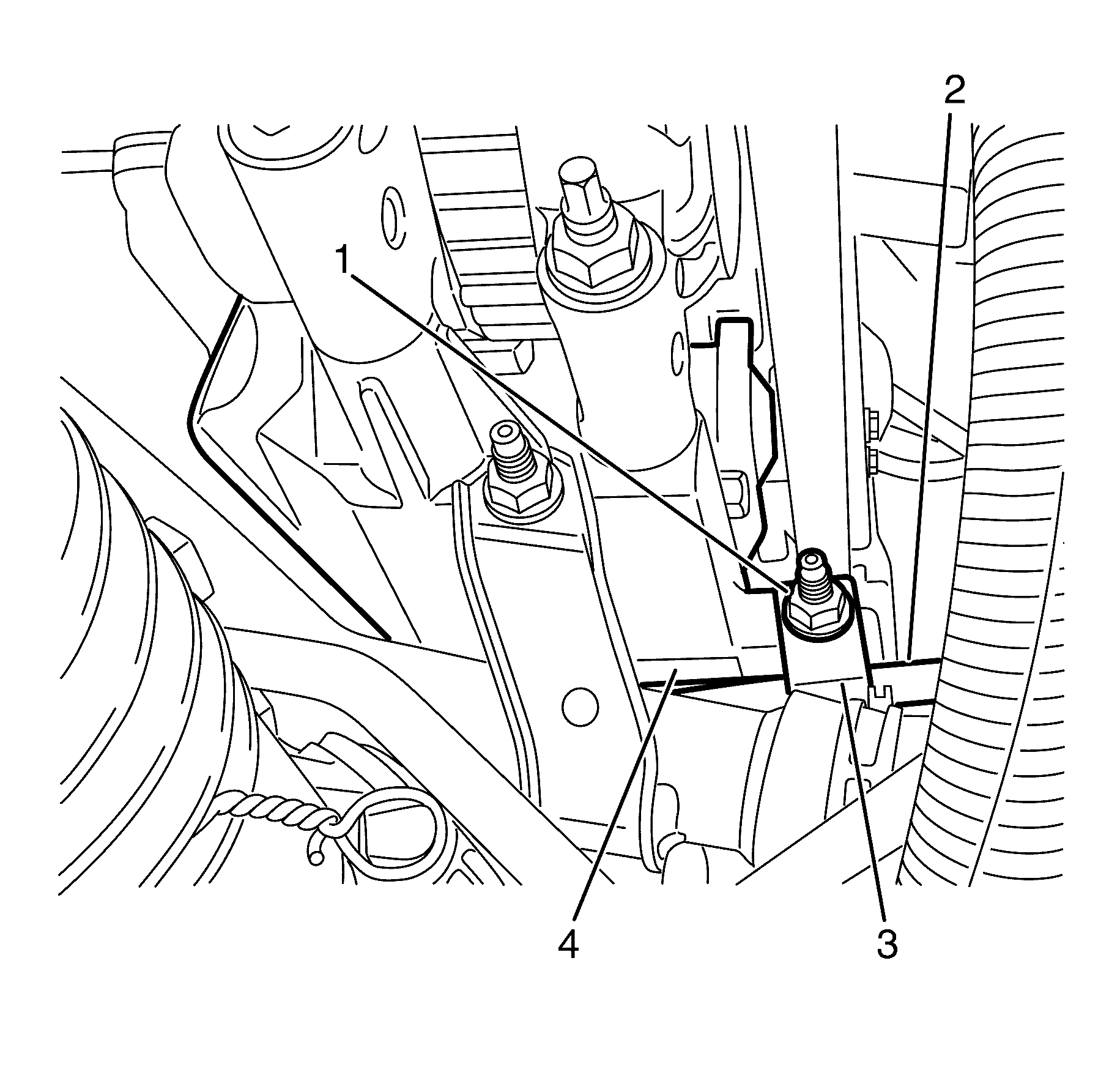
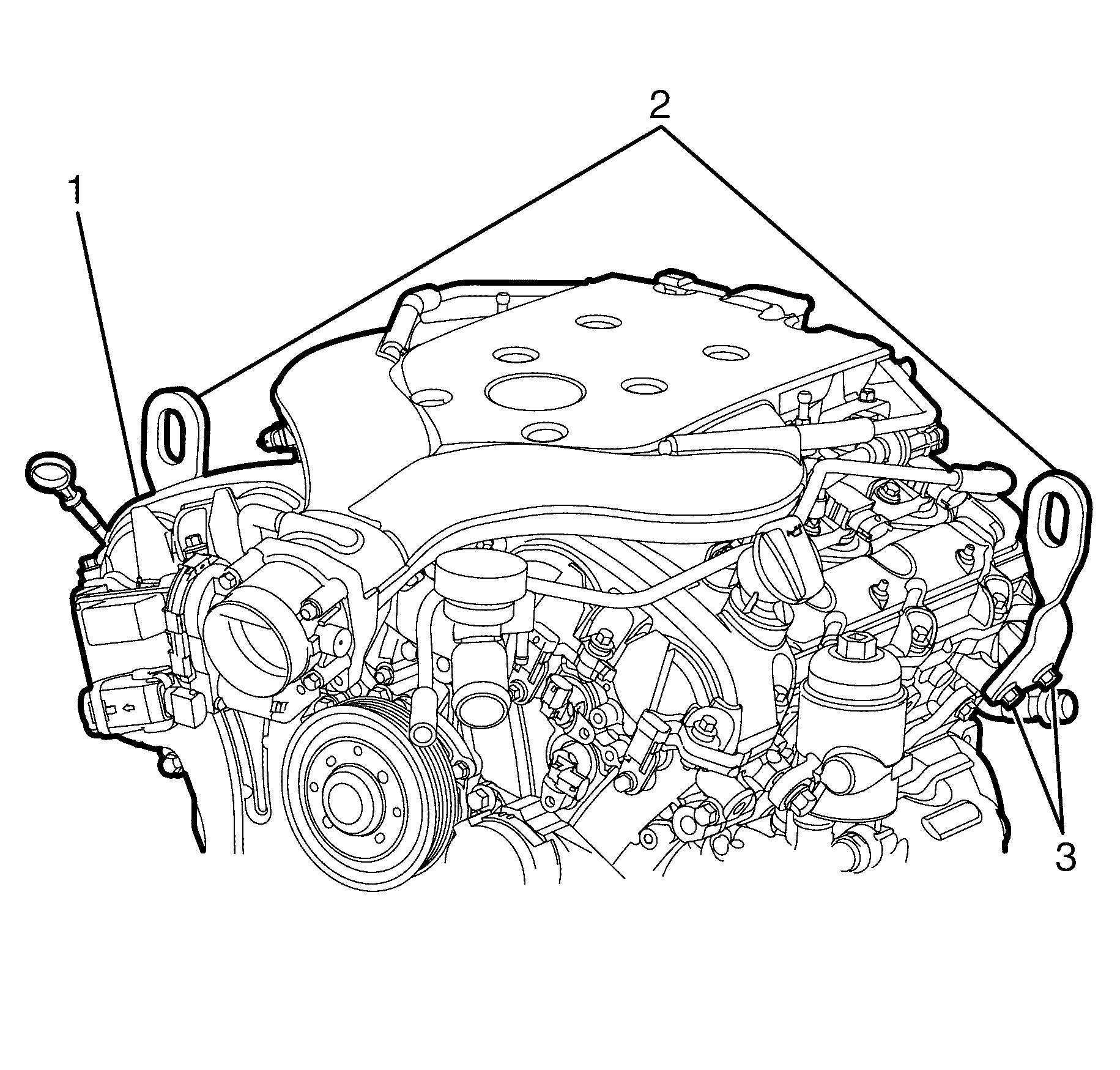
Caution: Refer to Fastener Caution in the Preface section.
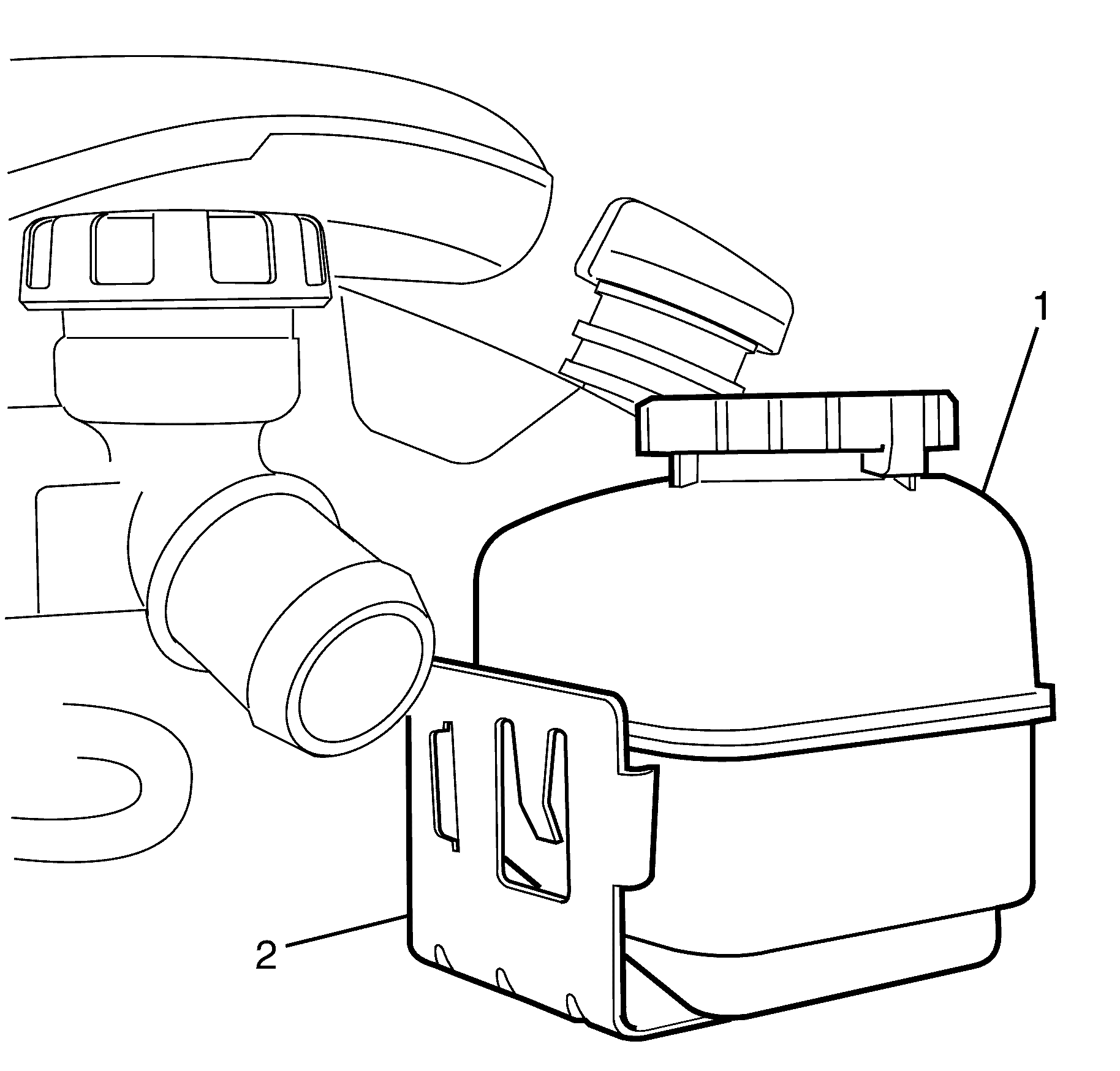
Note: The locking tang on the power steering reservoir bracket (2) must be released before removing the power steering reservoir (1). Release the locking tang on the power steering reservoir bracket (2) with a suitable tool.
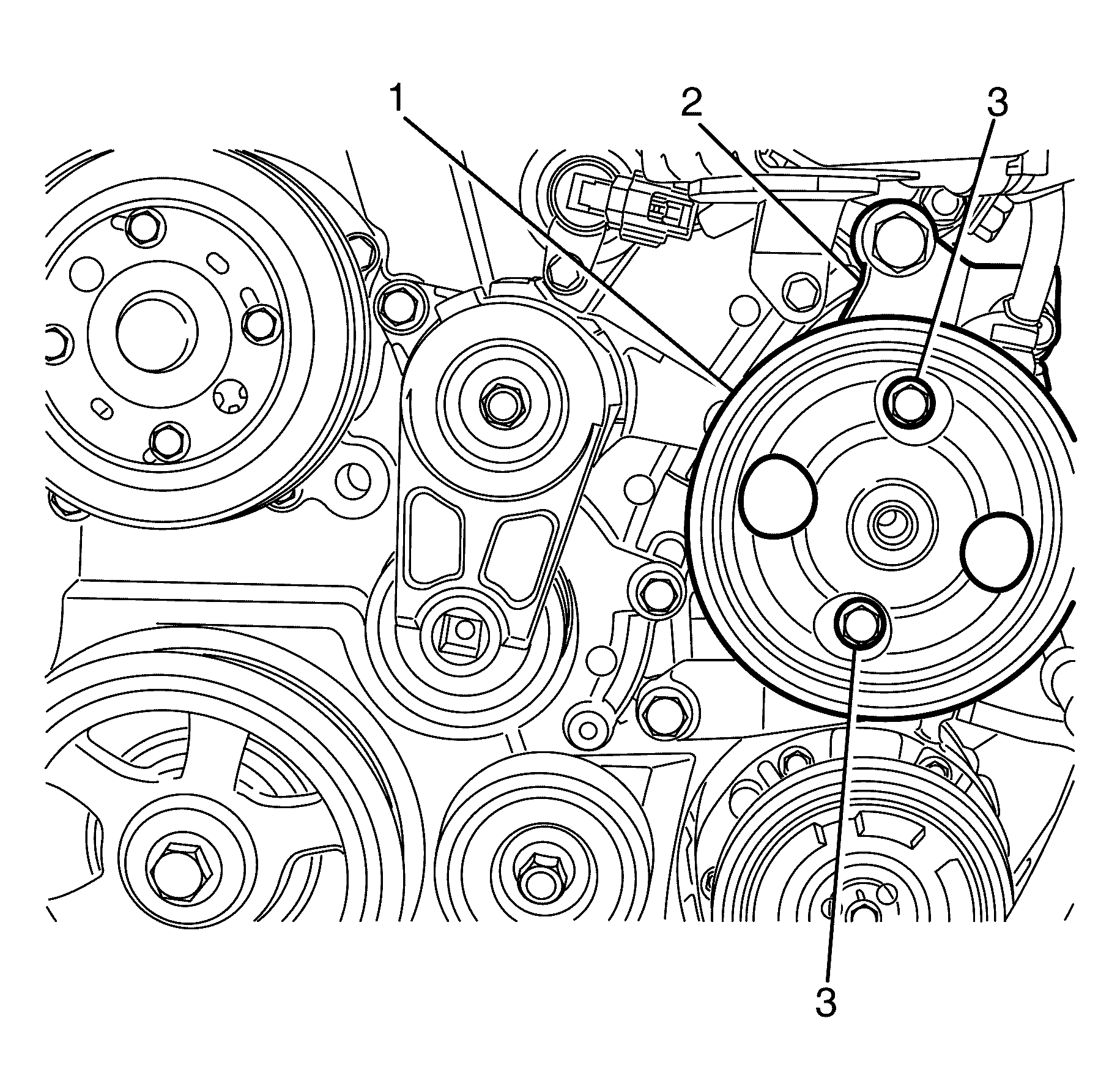
Note: DO NOT disconnect the power steering pipes/hoses.
Note: Bolts with micro-encapsulated thread sealant must be discarded after removal.
Note: Make sure all the bolt holes are thoroughly cleaned and all micro-encapsulated thread sealant is removed.
| • | Discard the bolts. |
| • | Clean the bolt hole. |
If required mount the engine on a suitable engine stand.
Installation Procedure
- Use a floor crane in order to install the engine to the frame.
- Install the engine mount brackets with the engine mounts. Refer to Engine Mount Bracket Replacement - Left Side and Engine Mount Bracket Replacement - Right Side.
- Raise the floor crane to partially support the engine
- Install the alternator bracket. Refer to Generator Bracket Replacement.
- Install the alternator. Refer to Generator Replacement.
- Install the A/C compressor mounting bracket. Refer to Compressor Mounting Bracket Replacement.
- Install the A/C compressor. Refer to Air Conditioning Compressor Replacement.
- Install the power steering pump (1) to the power steering pump bracket (2).
- Install the NEW power steering pump to the power steering pump bracket retaining bolts (3) and tighten to 27 N·m (22 lb ft).
- Install the power steering fluid reservoir to the power steering fluid reservoir bracket.
- Install the drive belt. Refer to Drive Belt Replacement.
- Install the catalytic converters. Refer to Catalytic Converter Replacement - Left Side and Catalytic Converter Replacement - Right Side.
- Install the flywheel. Refer to Engine Flywheel Removal.
- Install the transmission. Refer to Transmission Replacement in Automatic Transmission -- 5L40-E/5L50-E.
- Install the transmission cooler line clamp (3) and transmission cooler lines (2) to the alternator mounting bracket (4).
- Install the transmission cooler line clamp to the alternator mounting bracket retaining nut (1) and tighten to 22 N·m (16 lb ft).
- Install the engine and transmission wiring harness and related components. Refer to Engine Wiring Harness Assembly Removal.
- Remove the EN 46114 (2) on the engine (1).
- With the aid of an assistant, raise the table and/or lower the vehicle to install the engine, transmission, front suspension and subframe assembly to the vehicle.
- Install the transmission support to the body retaining bolts (1) and tighten to 58 N·m (43 lb ft).
- Install the subframe to the body retaining bolts (1) and tighten to 160 N·m (118 lb ft).
- Install the subframe to the body front retaining bolts (1) and tighten to 160 N·m (118 lb ft).
- Install the subframe to the body rear retaining bolts (1) and tighten to 240 N·m (177 lb ft).
- Install the subframe reinforcement plate (3) to the subframe (1).
- Install the subframe reinforcement plate to the subframe retaining bolts (2) and tighten to 17 N·m (13 lb ft)..
- Lower the lift table and/or raise the vehicle to remove the support from the frame, engine and transmission.
- Remove the powertrain and/or engine lift table from the frame, engine and transmission.
- Partially lower the vehicle.
- Check the torque of the strut assembly retaining nut (1), correct if necessary.
- Install the strut assembly (3) to the vehicle (4).
- Install the strut assembly to the body retaining plate (1).
- Install the NEW strut assembly to the body retaining nut (2) and tighten to 55 N·m (40 lb ft).
- Install the dust cover (1) to the strut assembly to body retaining nut (2).
- Partially raise the vehicle.
- Remove the heavy mechanics wire or equivalent (2) retaining the strut assembly (1) to the subframe (3).
- Connect the intermediate steering shaft (1) to the pinion shaft (3).
- Install the NEW intermediate steering shaft to the pinion shaft retaining bolt (2) and tighten to 25 N·m (18 lb ft).
- Connect the wheel speed sensor jumper harness electrical connector (1).
- Remove the heavy mechanic's wire, or equivalent support (2) from the brake caliper (1).
- Remove the wheel nuts (4) retaining the brake disc (3) to the hub (5).
- Install the brake caliper assembly (2) to the steering knuckle (3).
- Install the NEW brake caliper anchor plate to the knuckle retaining bolts (1) and tighten to 60 N·m +120° (44 lb in +120°).
- Attach the brake hose (1) to the strut mounted brake hose retaining bracket (2).
- Install the front wheels. Refer to Tire and Wheel Removal and Installation.
- Install the shift selector linkage rod (1) to the shift selector shaft (2).
- Install the shift selector linkage rod using the shift selector shaft retaining nut (3) and tighten to 9 N·m (80 lb in).
- Install the starter motor. Refer to Starter Motor Replacement.
- Install the propeller shaft. Refer to Propeller Shaft Replacement.
- Install the centre exhaust heat shield. Refer to Exhaust Heat Shield Replacement - Center.
- Install the Exhaust system. Refer to Exhaust System Replacement.
- Connect the low oil level sensor electrical connector (1).
- Remove the plug from the power steering cooler (3) and power steering reservoir inlet hose (2).
- Connect the power steering reservoir inlet hose (2) to the power steering cooler (3).
- Install the power steering reservoir inlet hose spring clamp (1) to its original location
- Remove the plug from the power steering cooler (3) and power steering reservoir inlet hose (1).
- Connect the power steering reservoir inlet hose (1) to the power steering cooler (3).
- Install the power steering reservoir inlet hose spring clamp (2) to its original location
- Install the engine splash shield. Refer to Engine Splash Shield Replacement.
- Install the front air deflector. Refer to Front Air Deflector Replacement.
- Lower the vehicle.
- Remove the zip ties (2) or equivalent securing the radiator and condenser assembly (3) to the front end assembly (1).
- Remove the clean lint free cloth at the transmission cooler lines (2) and the flexible hoses (1).
- Align both flexible hose's with both steel cooler lines.
- Hold the cooler line (2) and connect the flexible hose (1) by pushing together. Repeat procedure for other hose.
- Check and top up transmission fluid level if required.
- Remove the plug or cap at the fuel feed hose (1) and fuel feed pipe (2) ends.
- Connect the fuel feed hose (1) to the fuel feed pipe (2). Refer to Metal Collar Quick Connect Fitting Service or Plastic Collar Quick Connect Fitting Service.
- Remove the plug or cap at the EVAP purge line (4) and the purge solenoid (3) ends.
- Connect the EVAP purge line (4) to the purge solenoid (3). Refer to Metal Collar Quick Connect Fitting Service or Plastic Collar Quick Connect Fitting Service.
- Install a NEW sealing washer (3) to suction pipe joint.
- Position the upper suction pipe (1) to the lower suction pipe (2).
- Install the A/C suction pipe pad to the A/C suction pipe retaining nut (1) and tighten to 22 N·m(16 lb ft).
- Remove the plug or cap at the A/C suction/discharge pipe (1) ends and the compressor (2) ports.
- Fit the NEW A/C suction/discharge pipe sealing O-ring (2) to the suction pipe.
- Connect the A/C suction/discharge line pad (1) to the A/C compressor (2).
- Install the suction/discharge line pad to A/C compressor retaining nut (1).
- Connect the A/C compressor electrical connector (1).
- Connect the A/C pressure transducer electrical connector (1).
- Install the wiring harness (2).
- Install the remote battery positive post to the wiring harness retaining bolt (1) and tighten to 15 N·m (11 lb ft).
- Install the remote battery positive post cover (1).
- Connect the vehicle body ground cable (1) to the cylinder head (2).
- Install the vehicle body ground cable to the cylinder head retaining bolt (3) and tighten to 10 N·m(89 lb in)
- Slide the engine connector (3) into the body harness connector (1) to join.
- Attach the protector (1) to the base of the under hood BEC connector (2).
- Install the upper under hood BEC plate (1) to the lower under hood BEC plate (3).
- Install the under hood BEC upper plate to lower plate retaining bolts (2).
- Connect the positive cable (2) to the upper under hood BEC plate (4).
- Install the positive cable to the under hood BEC plate retaining bolt (5) and tighten to 10 N·m(89 lb ft).
- Install the positive cable protective cover (3).
- Install the under hood body electrical centre (BEC) lid (1).
- Connect the 56 pin engine wiring harness to main wiring harness electrical connector (1).
- Connect the 2 pin engine wiring harness to main wiring harness electrical connector (2).
- Connect ECM electrical connectors (2).
- Rotate the engine control module (ECM) electrical connector levers (1) to the locked position.
- Install the engine coolant heater cord if fitted. Refer to Coolant Heater Cord Replacement.
- Connect the vacuum hose (1) to the intake manifold vacuum port (3).
- Compress the vacuum hose retaining clamp (2) and slide along the vacuum hose (1) to the correct location to secure the vacuum hose (1) to the intake manifold vacuum port (3).
- Attach the heater hose (1) quick connect fitting (3) by pushing the hose onto the heater pipe (2).
- Remove the plug or cap at the cooling system hoses and inlets
- Install the coolant bleed hose (3) to the outlet housing (1).
- Compress the coolant bleed hose retaining clamp (4) and position back to its original location on the coolant bleed hose (3).
- Connect the coolant recovery hose (2) from the outlet housing (1).
- Install the radiator outlet hose. Refer to Radiator Outlet Hose Replacement.
- Connect the battery ground cable. Refer to Battery Negative Cable Disconnection and Connection.
- Refill the cooling system. Refer to Cooling System Draining and Filling.
- Install the air intake duct. Refer to Air Cleaner Inlet Duct Replacement.
- Recharge the air conditioning (A/C) system. Refer to Refrigerant Recovery and Recharging.
- Install the radiator air intake baffle. Refer to Radiator Air Upper Baffle and Deflector Replacement.
- Install the engine covers. Refer to Engine Cover Replacement.
- Disable the ignition system.
- Crank the engine several times. Listen for any unusual noises or evidence that parts are binding.
- Enable the ignition system.
- Start the engine and listen for unusual noises.
- Check the vehicle oil pressure gauge and confirm that the engine has acceptable oil pressure.
- Run the engine speed at about 1,000 RPM until the engine has reached normal operating temperature.
- Listen for sticking stationary hydraulic lash adjuster, (SHLAs) (valve lifters) and other unusual noises.
- Inspect for fuel, oil, and/or other coolant leaks while the engine is running.

Caution: Refer to Fastener Caution in the Preface section.

Note: Make sure the power steering reservoir (2) and the power steering reservoir bracket locking tang (1) are engaged to avoid an induced rattle condition.


Note: Make sure that all the hoses, wires, pipes and shock modules clear the vehicle during the installation process.





Caution: Refer to Fastener Caution in the Preface section.
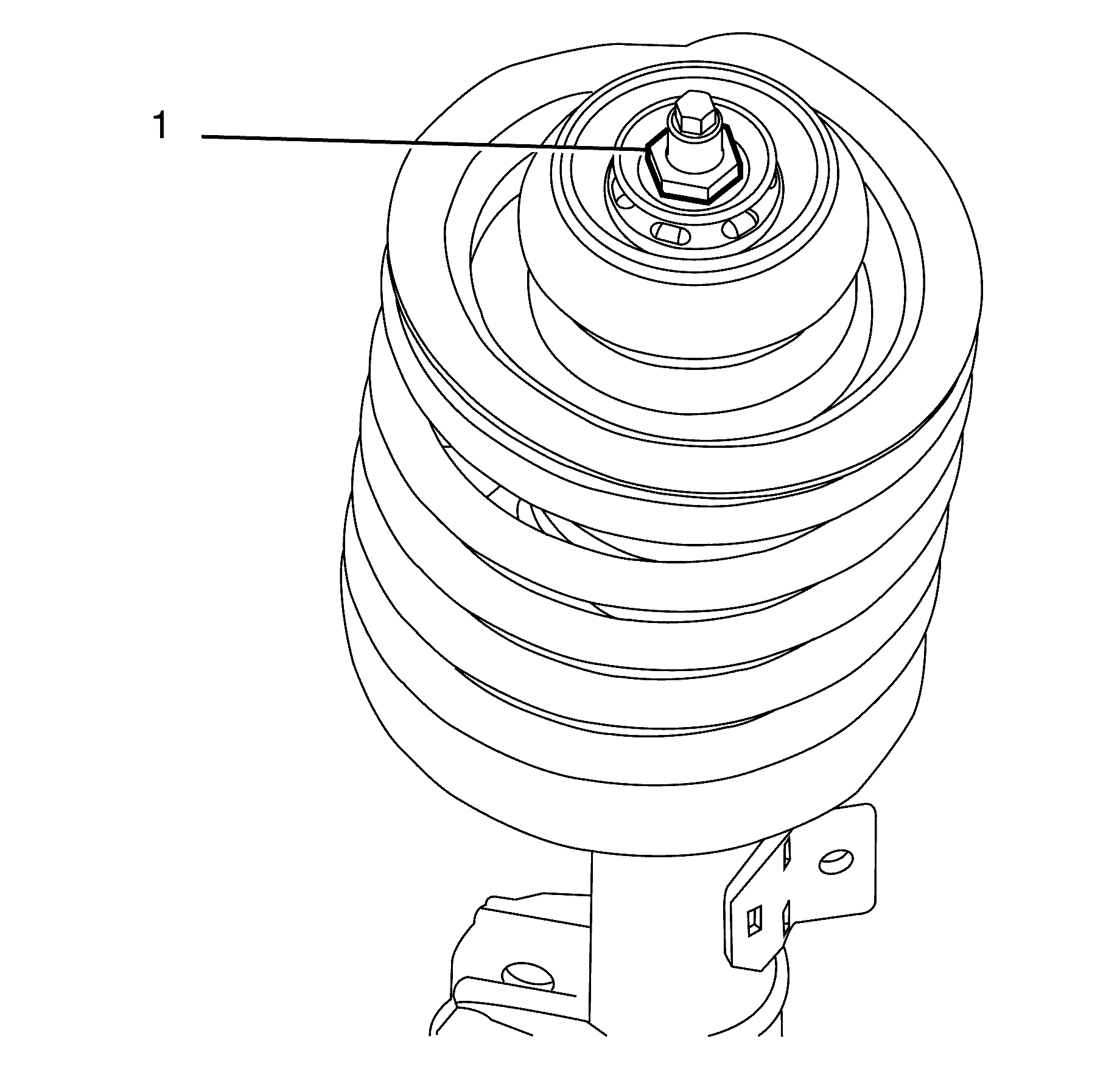
Note: The strut assembly retaining nut (1) must be checked for correct torque before installing the strut assembly into the vehicle. The strut assembly retaining nut torque must be 75 N·m (55 lb ft).
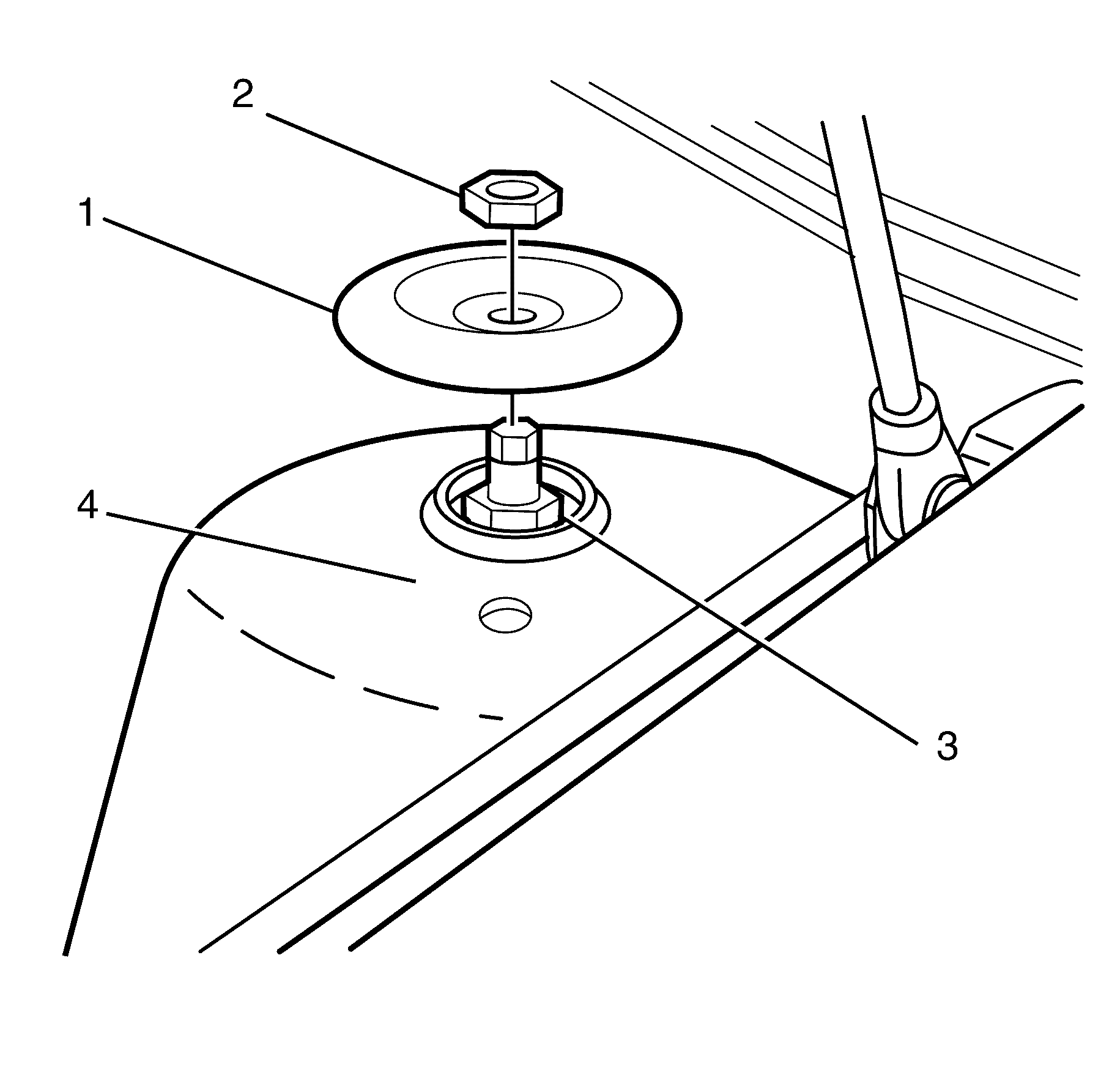
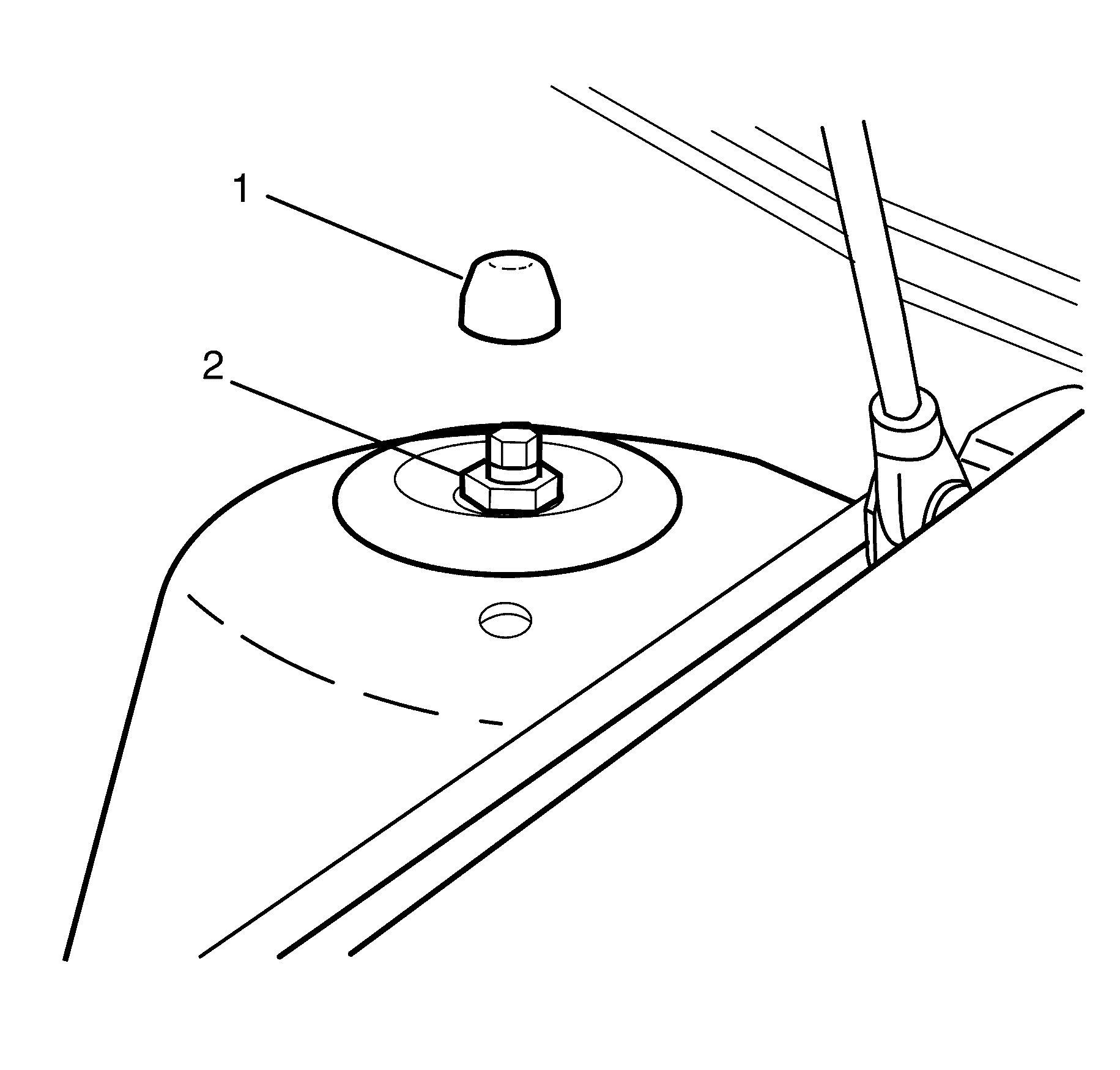


Note: The intermediate steering shaft and pinion shaft splines must be installed in the position recorded during removal and aligned with the marks previously made.



Caution: Make sure the brake hose is not twisted or kinked after installation. Damage to the hose could result.

Caution: Make sure the brake hose is not twisted or kinked after installation. Damage to the hose could result.




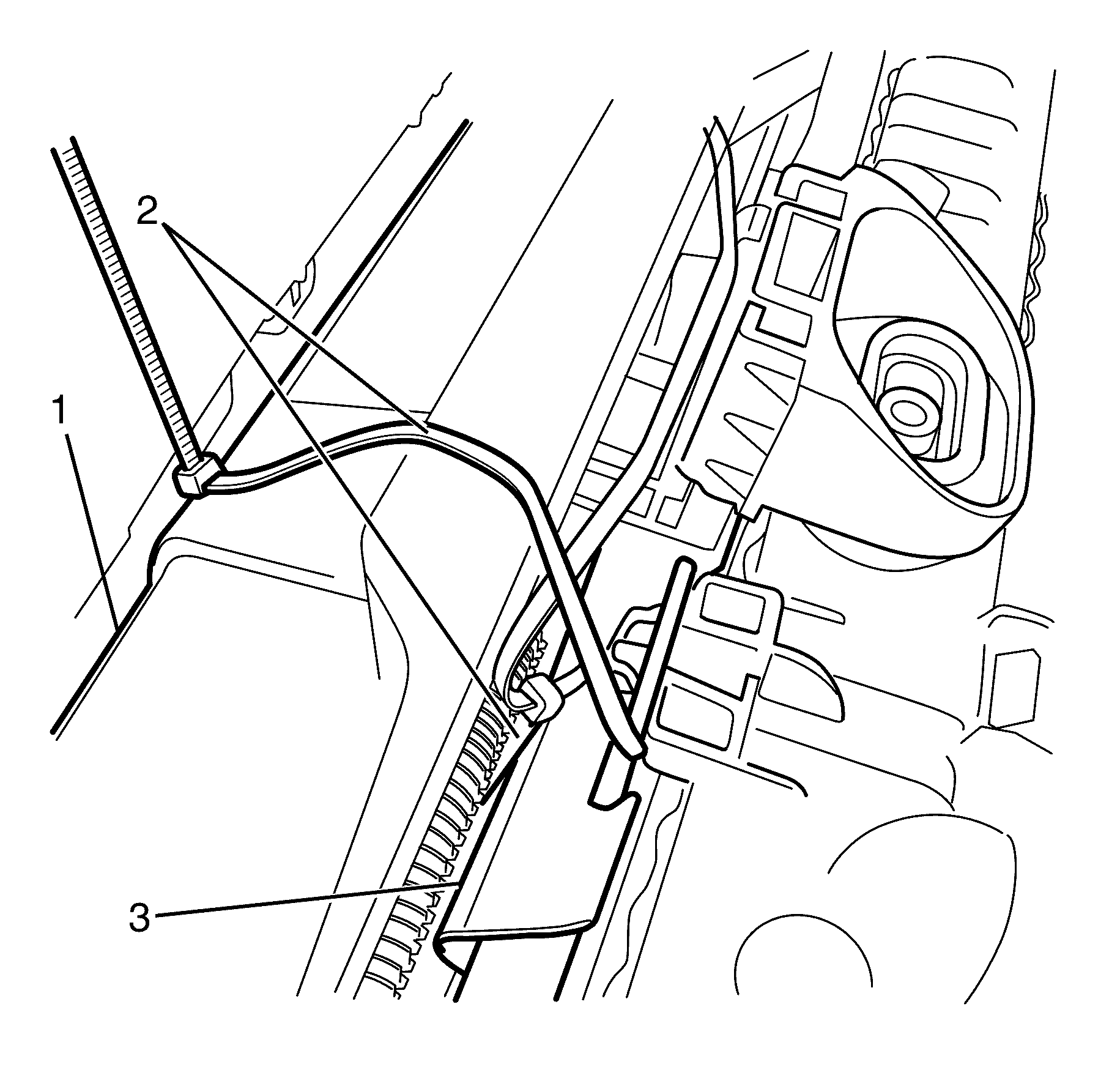

Note: The AU-525 is not required for installation.
Note: The flexible hoses are not serviced separately. Therefore if the hose's require replacement, then the hose and radiator to hose cooler hose assembly must be fitted.
Note: Listen for an audible click to confirm fitting.
Note: When adding or changing transmission fluid use only recommended automatic transmission fluid.


Note: DO NOT coat the new sealing washer with oil. They must be fitted dry. The use of mineral oil will render the washer useless, as the washer WILL swell causing refrigerant to leak out.


Note: The A/C sealing O-rings must be fitted dry. DO NOT lubricate the A/C sealing O-rings.





Note: Make sure the clips on the remote battery positive post cover (1) are engaged to avoid an induced rattle condition.


Note: Listen for a audible click from the locking tang (2) to confirm fitting.


Note: The under hood BEC upper plate to lower plate retaining bolts (2) DO NOT have a torque specification. Listen for an audible clicking sound whilst tightening the under hood BEC upper plate to lower plate retaining bolts (2) to confirm correct fitting.




Caution: Refer to Installing Hoses without Twists or Bends Caution in the Preface section.

Note: Listen for a audible click to confirm fitting in two places

If necessary, install an oil pressure gauge and measure the engine oil pressure.
